
John Leahy
Chief Operating Officer, Customers
Growing Horizons
Global Market Forecast
2017 - 2036
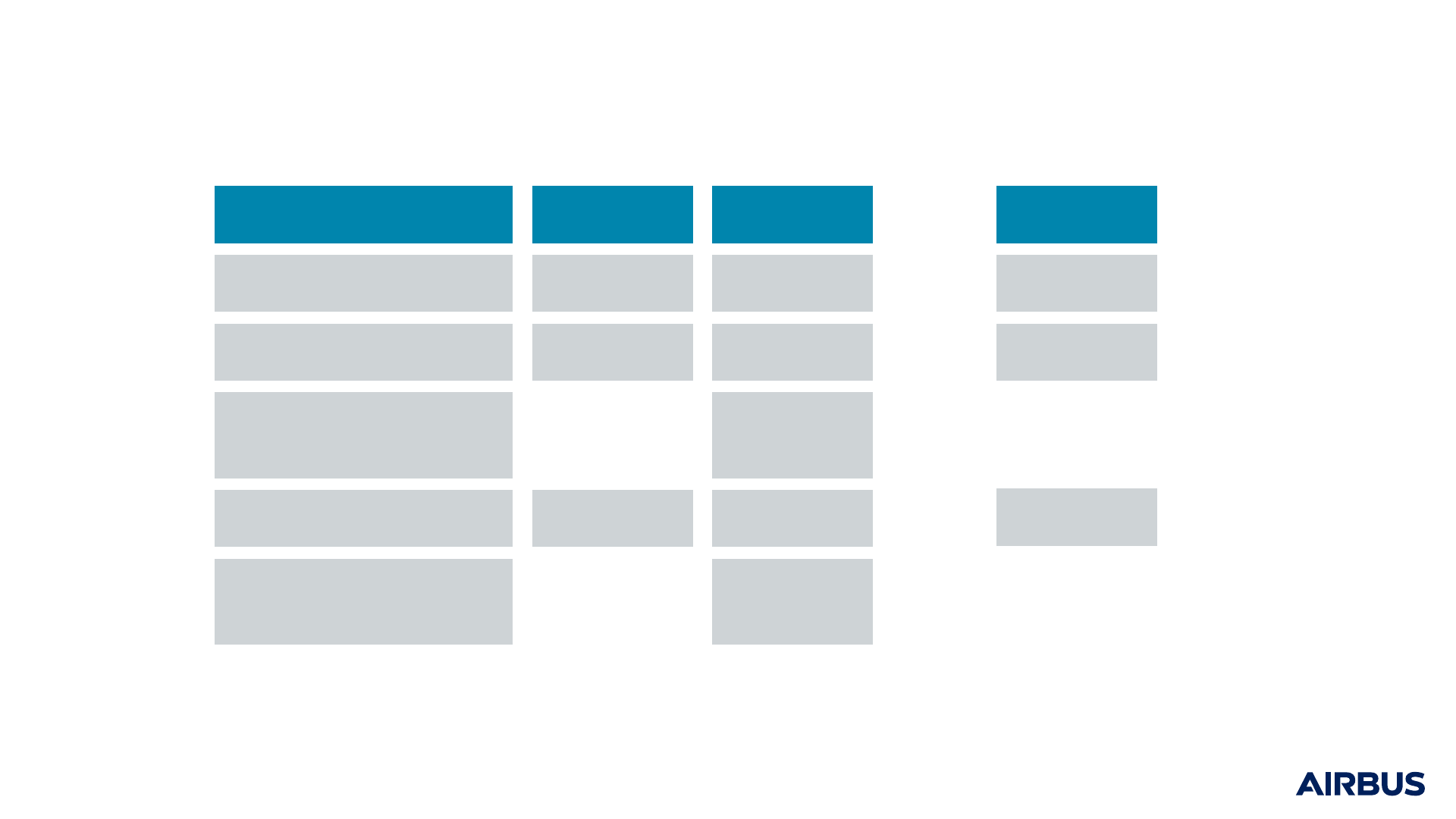
Global Market Forecast 2017: Highlights
Notes: Passenger aircraft (≥ 100 seats) | Jet freight aircraft (>10 tonnes)
Source: Airbus GMF 2017
2
World Fleet Forecast 2016 2036
RPK (trillions) 7.0 16.5
Passenger Aircraft Fleet 18,890 40,120
New passenger aircraft
deliveries
34,166
Dedicated Freighters 1,610 2,410
New freighter aircraft
deliveries
733
Total New Aircraft Deliveries
34,899
vs.
GMF16
+3.1%
+6.4%
+1,741
% change
2016-2036
135%
112%
50%
+88
+14.2%
+1,829
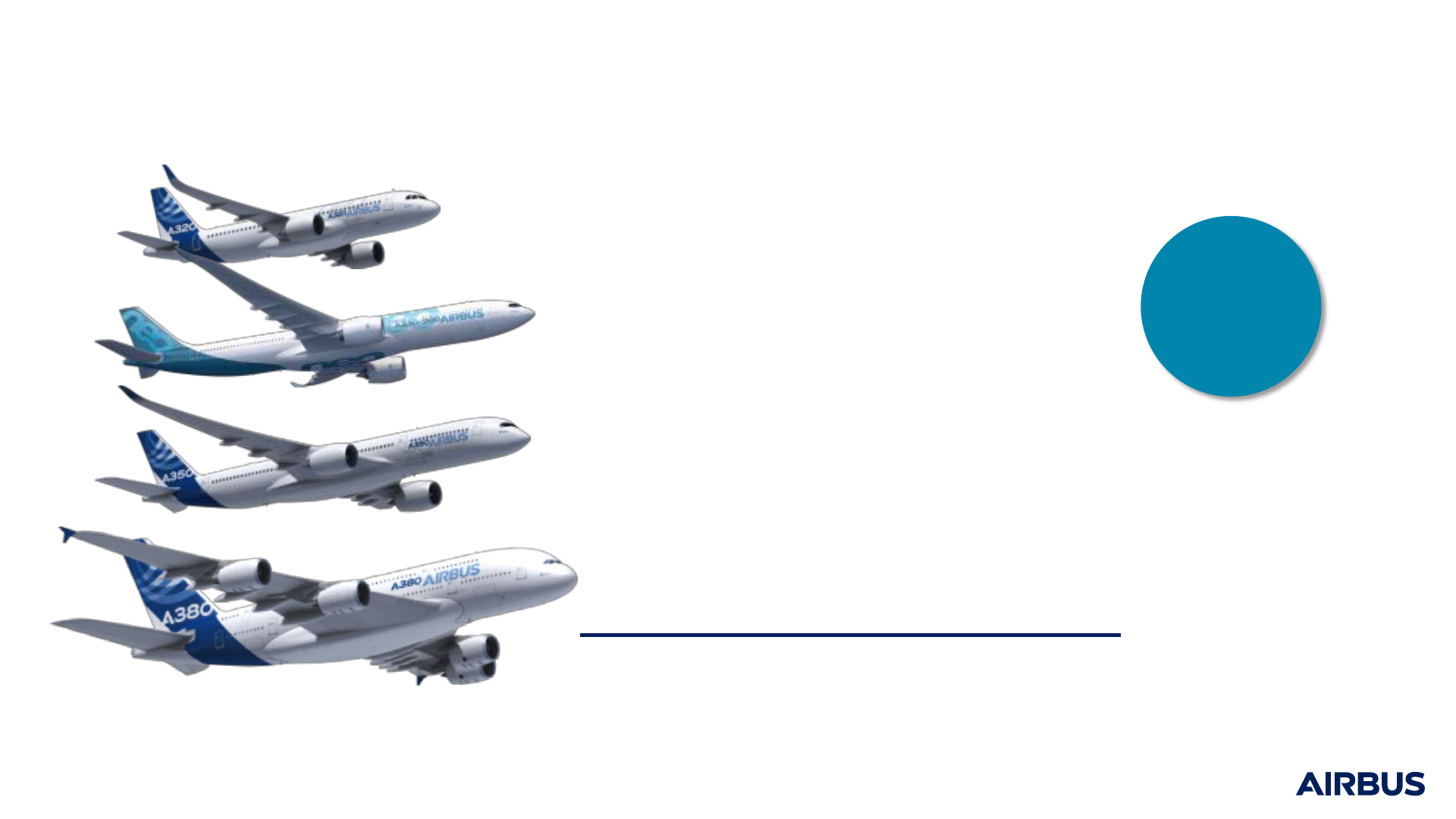
20-year demand for almost 35,000 new passenger and freighter aircraft
Notes: Passenger aircraft (≥ 100 seats) | Jet freight aircraft (>10 tonnes)
Source: Airbus GMF 2017
3
34,899 new aircraft
24,807 single-aisle aircraft
8,686 twin-aisle aircraft
1,406 very large aircraft
5.3
$US trillion
+1,277 vs GMF 2016
+626
-74
+1,829
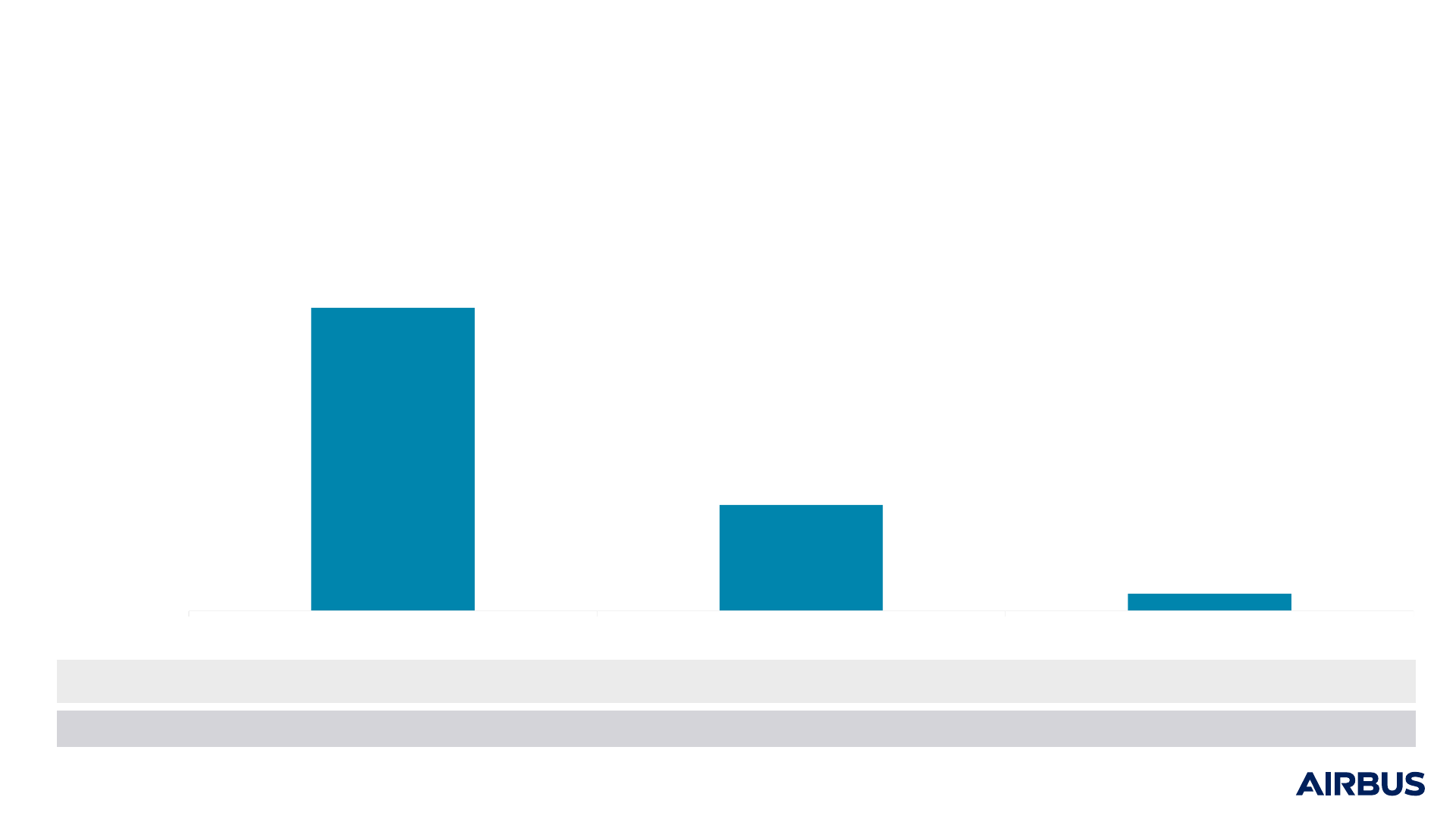
Single-aisle represent 71% of units, and widebodies represent 54% of value
Notes: Passenger aircraft (≥ 100 seats) | Jet freight aircraft (>10 tonnes), Rounded figures to the nearest 10
Source: Airbus GMF 2017
4
Number of aircraft
24,810
8,690
1,410
0
5,000
10,000
15,000
20,000
25,000
30,000
Single-aisle Twin-aisle Very Large Aircraft
% units
71% 25% 4%
% value
46% 44% 10%
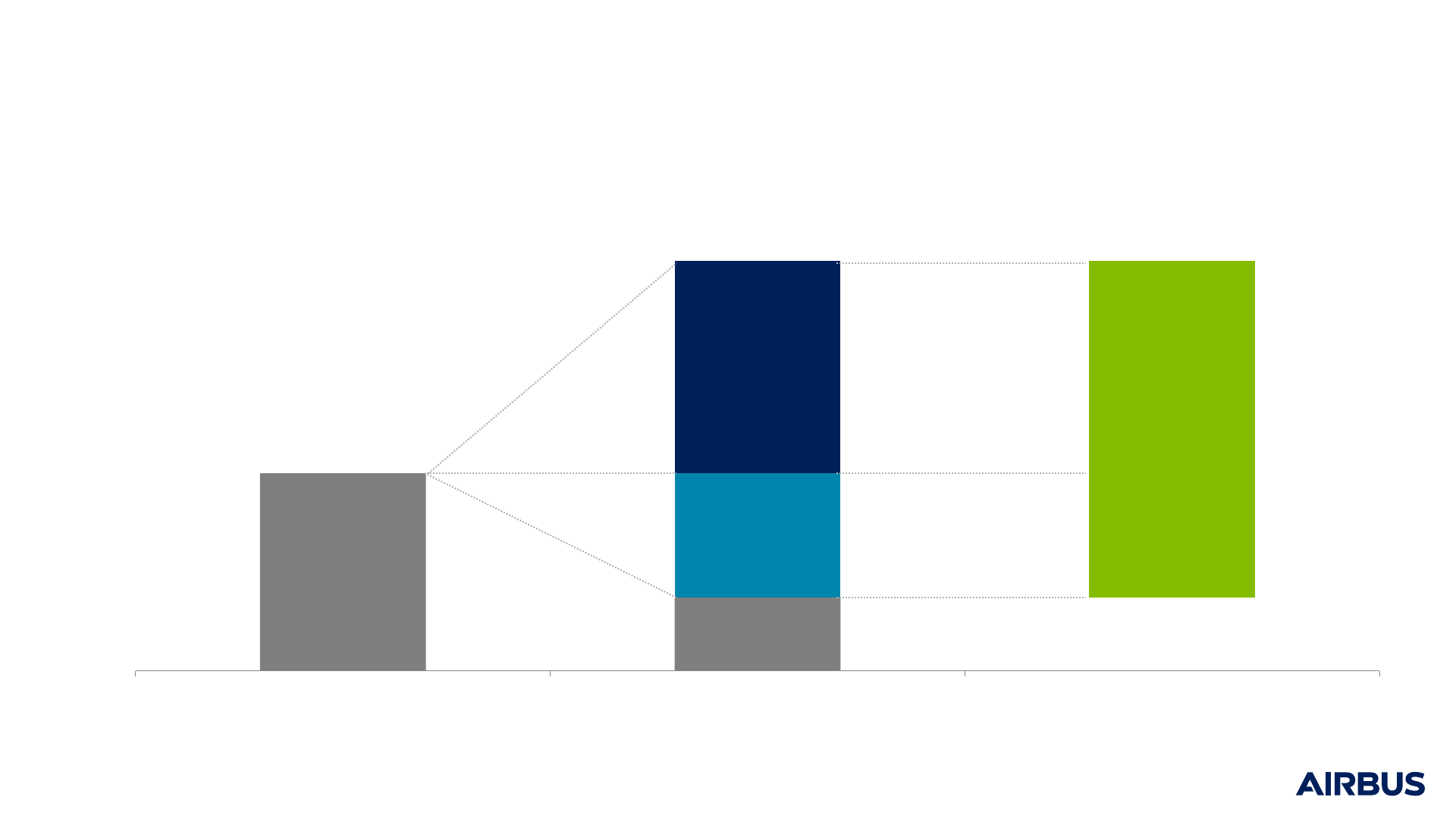
Fleet in service evolution
Notes: Passenger aircraft (≥ 100 seats) | Jet freight aircraft (>10 tonnes), Rounded figures to the nearest 10
Source: Airbus GMF 2017
5
Number of aircraft*
20,500
7,630
12,870
22,030
34,900
-
5,000
10,000
15,000
20,000
25,000
30,000
35,000
40,000
45,000
Beginning 2017 2036 New Deliveries
20-year
new deliveries
Replacement
Growth
Stay

2016 was a good year
20
42
64
78
0
10
20
30
40
50
60
70
80
90
<0% [0% - 5%] [5% - 10%] >10%
Source: ICAO, OAG, IHS Economics, Airbus GMF
6
Number of countries
% - ASK growth 2015-2016
142 countries
81% of world population
88% of world GDP
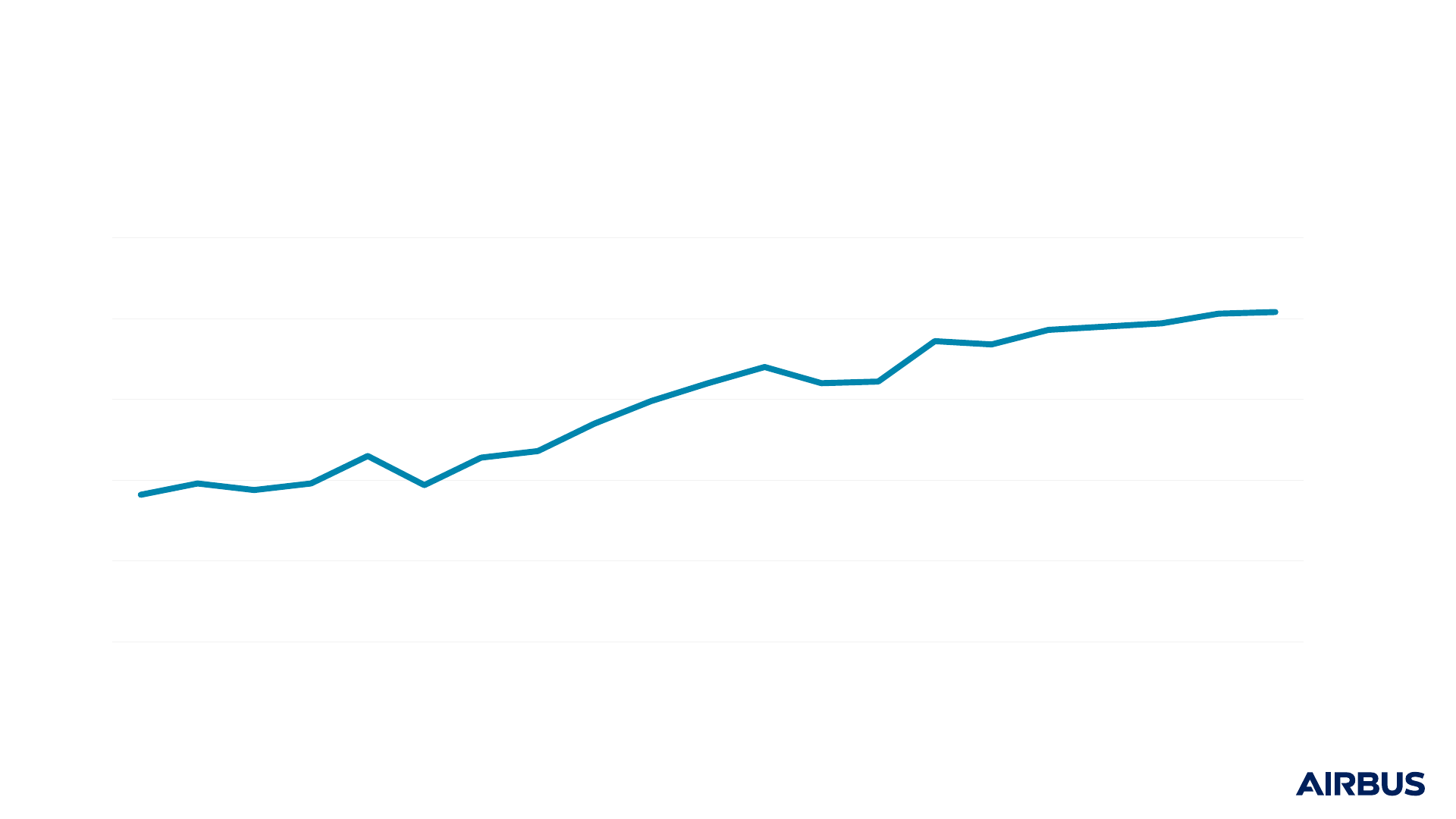
World load factors remain at record levels
Source: ICAO, OAG, IHS Economics, Airbus GMF
7
World passenger load factor - %
60%
65%
70%
75%
80%
85%
1996 2001 2006 2011 2016
80%
69%
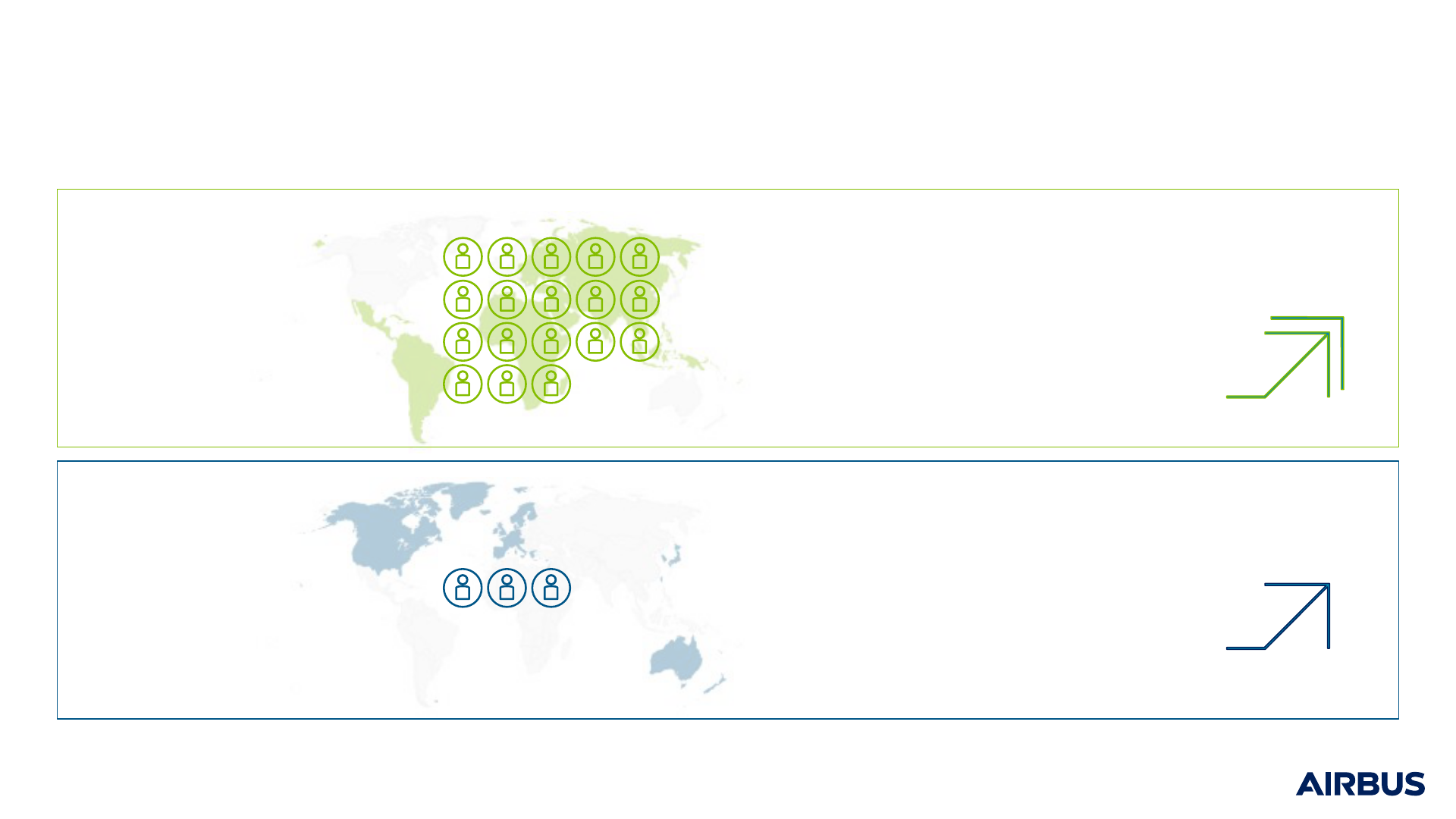
Air transport growth is highest in expanding regions
Source: IHS Economics, Airbus GMF 2017
8
Yearly RPK growth
2016 - 2036
Emerging/Developing
China
India
Middle East
Rest of Asia
Africa
CIS
Latin America
Central Europe
+5.8 %
Advanced
Western Europe
Israel
North America
Japan
Singapore
South Korea
Australia/New Zealand
+3.2 %
1
billion people
in 2016
6.4
billion people
in 2016
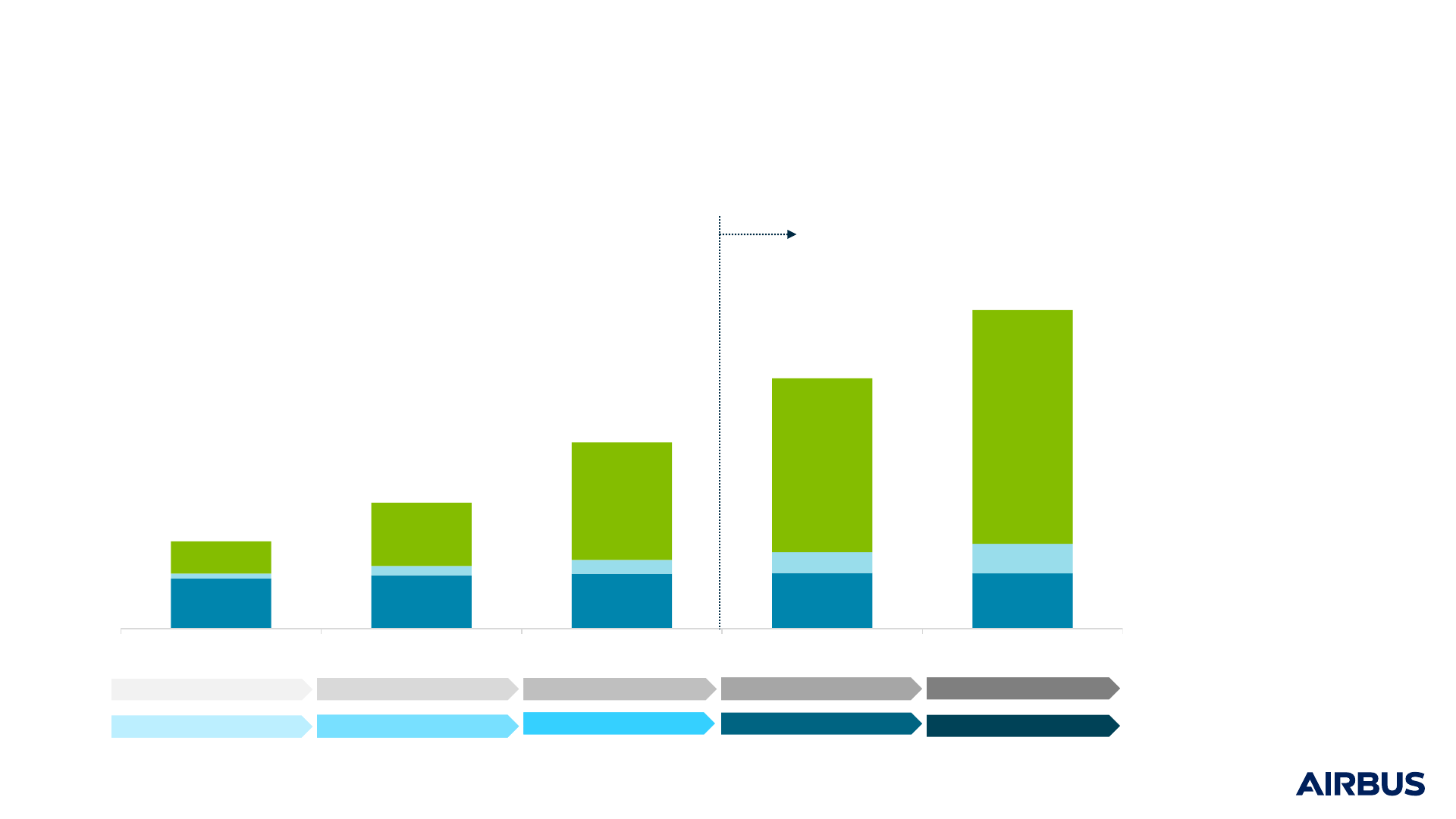
781
828
850
865
859
73
144
216
322
456
501
981
1,822
2,695
3,624
0
1,000
2,000
3,000
4,000
5,000
6,000
1996e** 2006 2016 2026 2036
Middle Class to almost double over the next 20 years
Rounded total to nearest 50
* Households with yearly income between $20,000 and $150,000 at PPP in constant 2016 prices
** Estimate for 1996 split by region
Source: Oxford Economics, Airbus GMF
9
People in Middle Class* (million)
Emerging countries
Developing countries
Advanced countries
8,900
56%
World Population (M.)
% of world population
8,200
47%
7,430
39%
6,600
30%
5,820
23%
Forecast
4,950
3,900
2,900
1,950
1,350
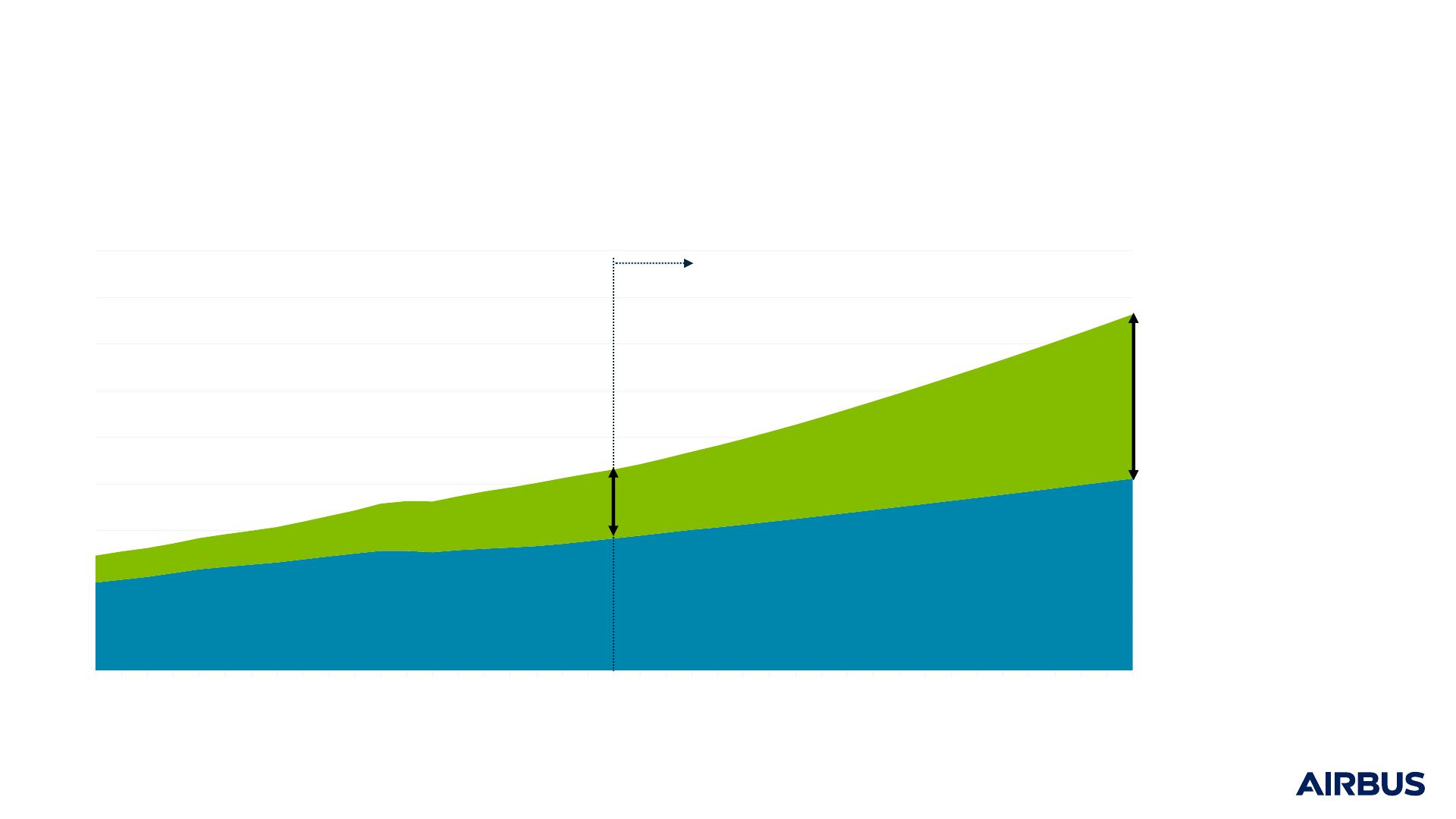
Almost 50% of world’s private consumption to come from emerging markets
Source: IHS Economics, Airbus GMF 10
World private consumption (trillion 2010 $US)
0
10
20
30
40
50
60
70
80
90
1996 2000 2004 2008 2012 2016 2020 2024 2028 2032 2036
Forecast
Advanced countries
54%
66%
77%
Emerging/Developing
countries
34%
23%
46%
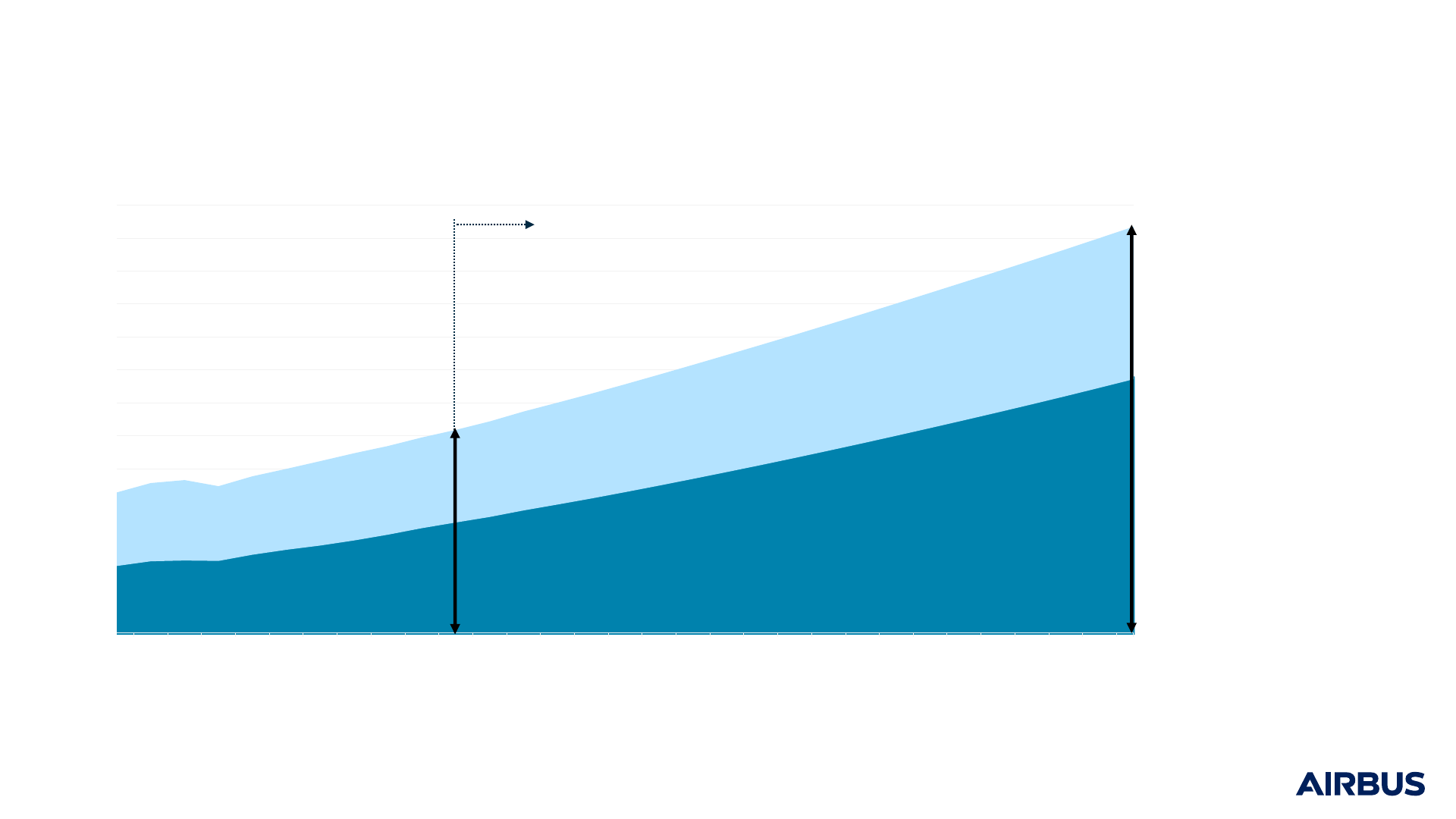
0
200
400
600
800
1,000
1,200
1,400
1,600
1,800
2,000
2,200
2,400
2,600
2006 2011 2016 2021 2026 2031 2036
~60% of international tourists to be transported by air in 2036
Source: UNWTO, Sabre GDD, Airbus GMF 11
International tourist arrivals (million)
>1.2bn tourists
Forecast
48%
Share of tourists travelling by air
51%
54%
57%
>2.4bn tourists
59% 61%
62%
Tourism by Air
Tourism by surface
(Road , Water, Rail)
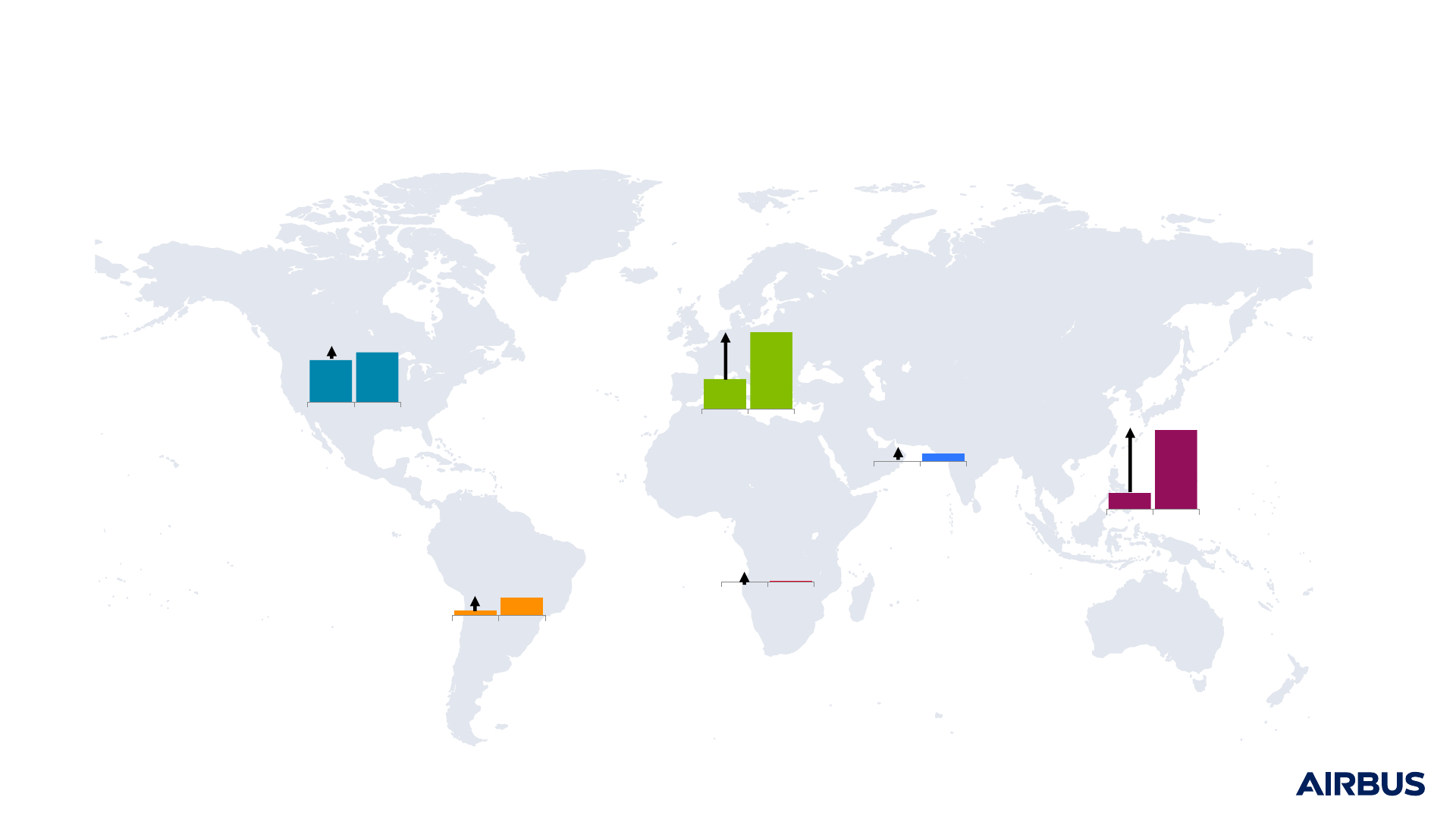
Low Cost Carrier market penetration has increased significantly since 2006
Source: OAG – September of each year, Airbus GMF
12
North America
Europe-CIS
Asia-Pacific
Middle East
Africa
Latin America
2006 2016
2006 2016
2006 2016
2006 2016
2006 2016
2006 2016
Low Cost Carrier seats offered on domestic and intra-regional flights (million)
38m
>39m
25m
9m
4m
0.6m
x1.2
x2.6
x4.8
x3.9
x16.4
x5.7
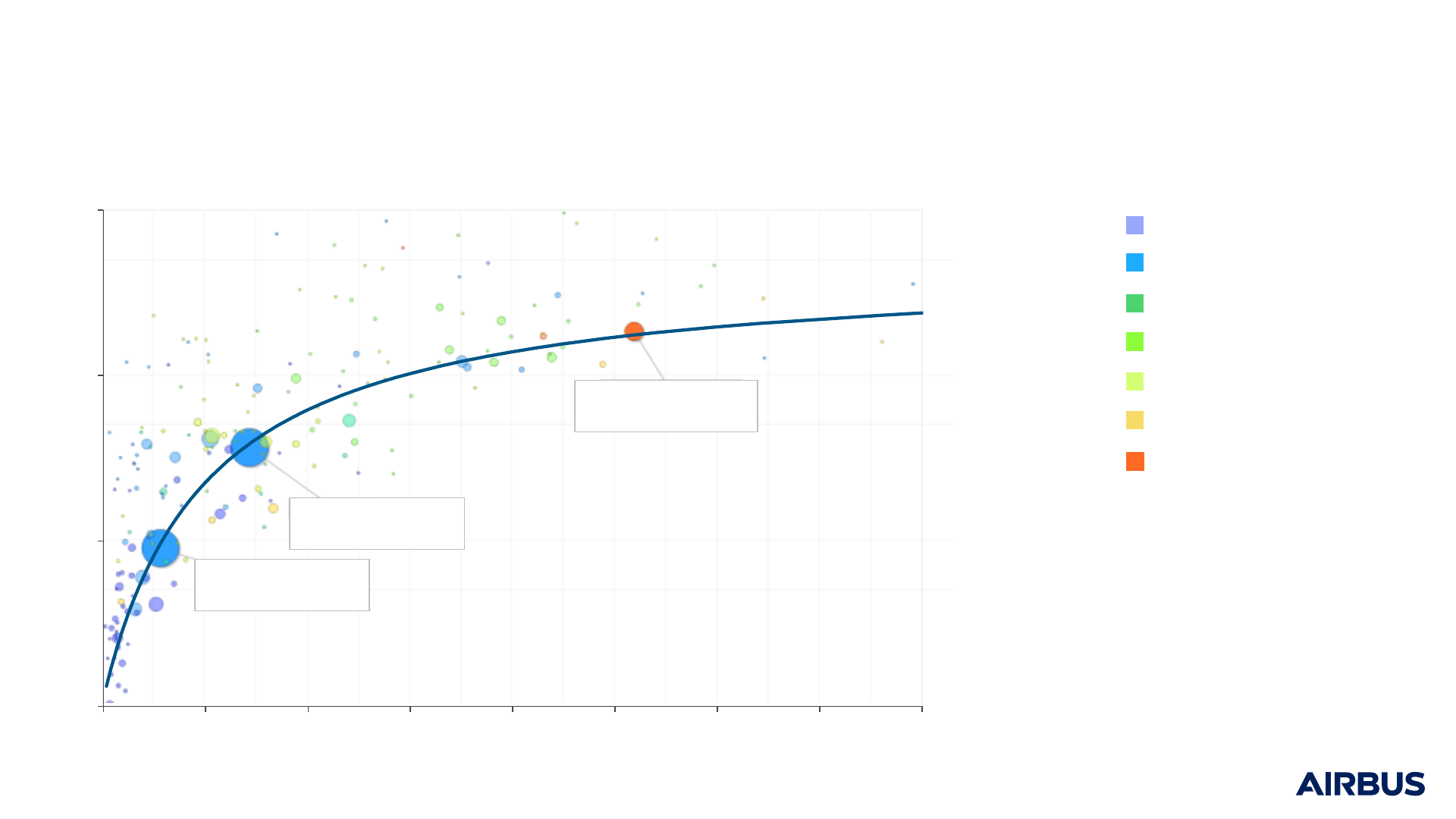
~30% of the people from emerging countries took a flight in 2016…
Source: Sabre, IHS Economics, Airbus GMF 2017
13
2016 trips per capita
2016 real GDP per capita
(2010 $US thousands at Purchasing Power Parity)
Africa
Asia/Pacific
CIS
Europe
Latin America
Middle East
North America
0.01
0.1
1
10
0 10 20 30 40 50 60 70 80
India, 2016
0.1 trips per capita
India, 2016
0.1 trips per capita
China, 2016
0.4 trips per capita
United States, 2016
1.8 trips per capita
Bubble size proportional to population
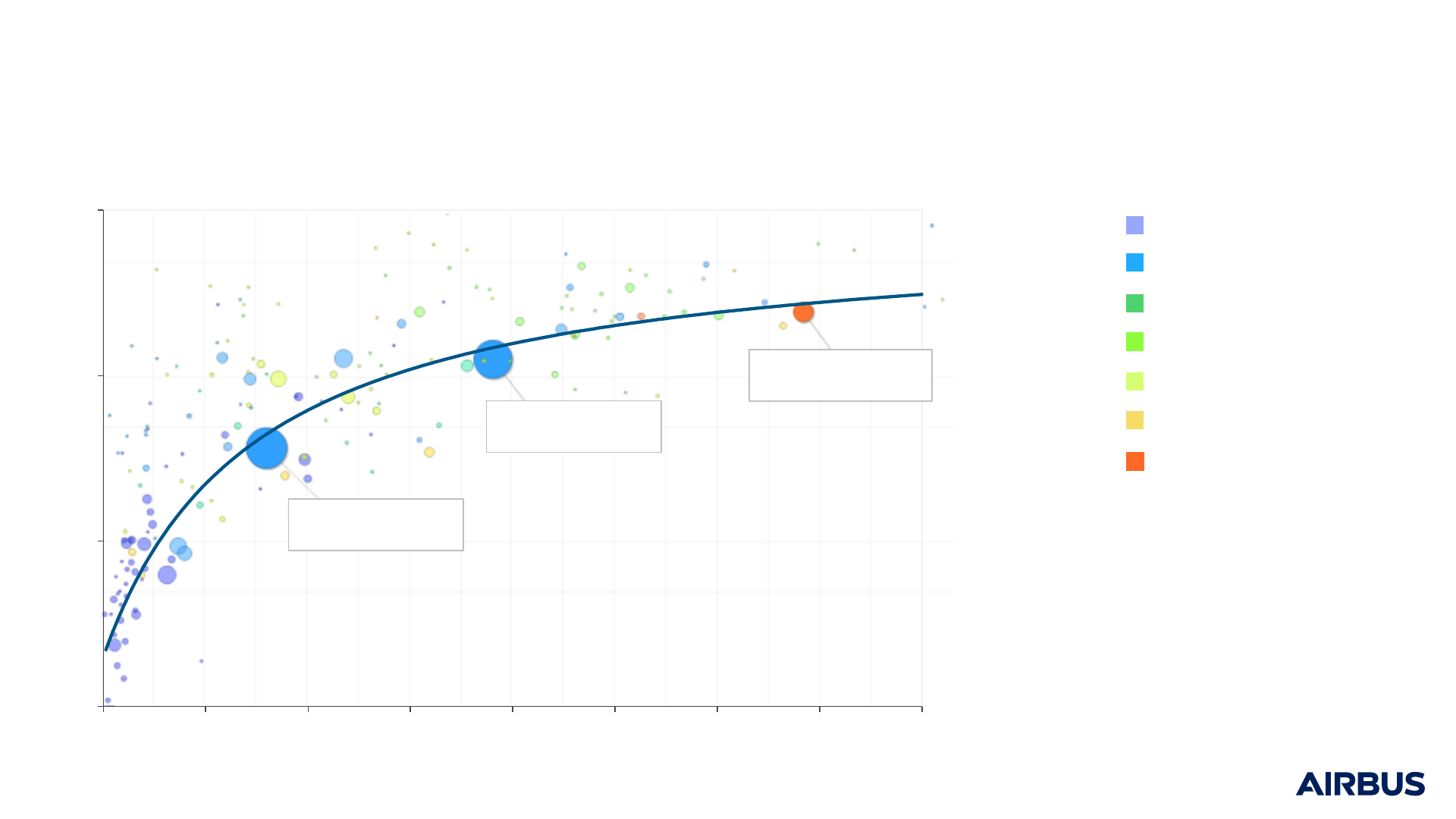
… in 2036, it will be 83%
Sources: Sabre, IHS Economics, Airbus GMF 2017
14
Africa
Asia/Pacific
CIS
Europe
Latin America
Middle East
North America
0.01
0.1
1
10
0 10 20 30 40 50 60 70 80
2036 trips per capita
2036 real GDP per capita
(2010 $US thousands at Purchasing Power Parity)
India, 2036
0.4 trips per capita
China, 2036
1.3 trips per capita
United States, 2036
2.5 trips per capita
Bubble size proportional to population
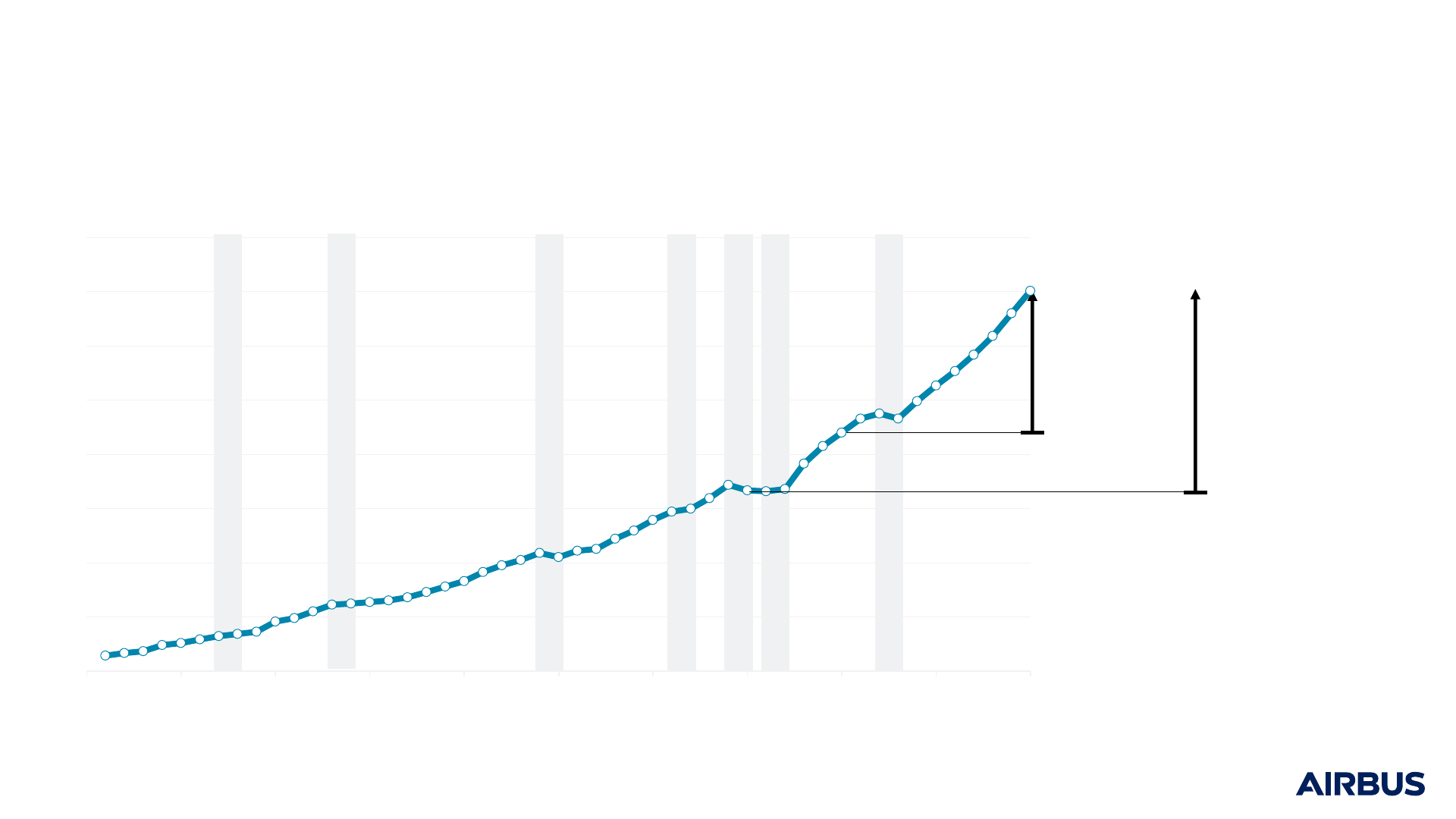
Air travel has proved to be resilient to external shocks
RPK = Revenue Passenger Kilometre
Source: ICAO, Airbus GMF
15
World annual traffic (trillion RPKs)
Oil Crisis Gulf Crisis Oil Crisis
Asian
Crisis
WTC
Attack
SARS
Financial
Crisis
x2
since 9/11
+60%
growth over the
last 10 years
0
1
2
3
4
5
6
7
8
1966 1971 1976 1981 1986 1991 1996 2001 2006 2011 2016
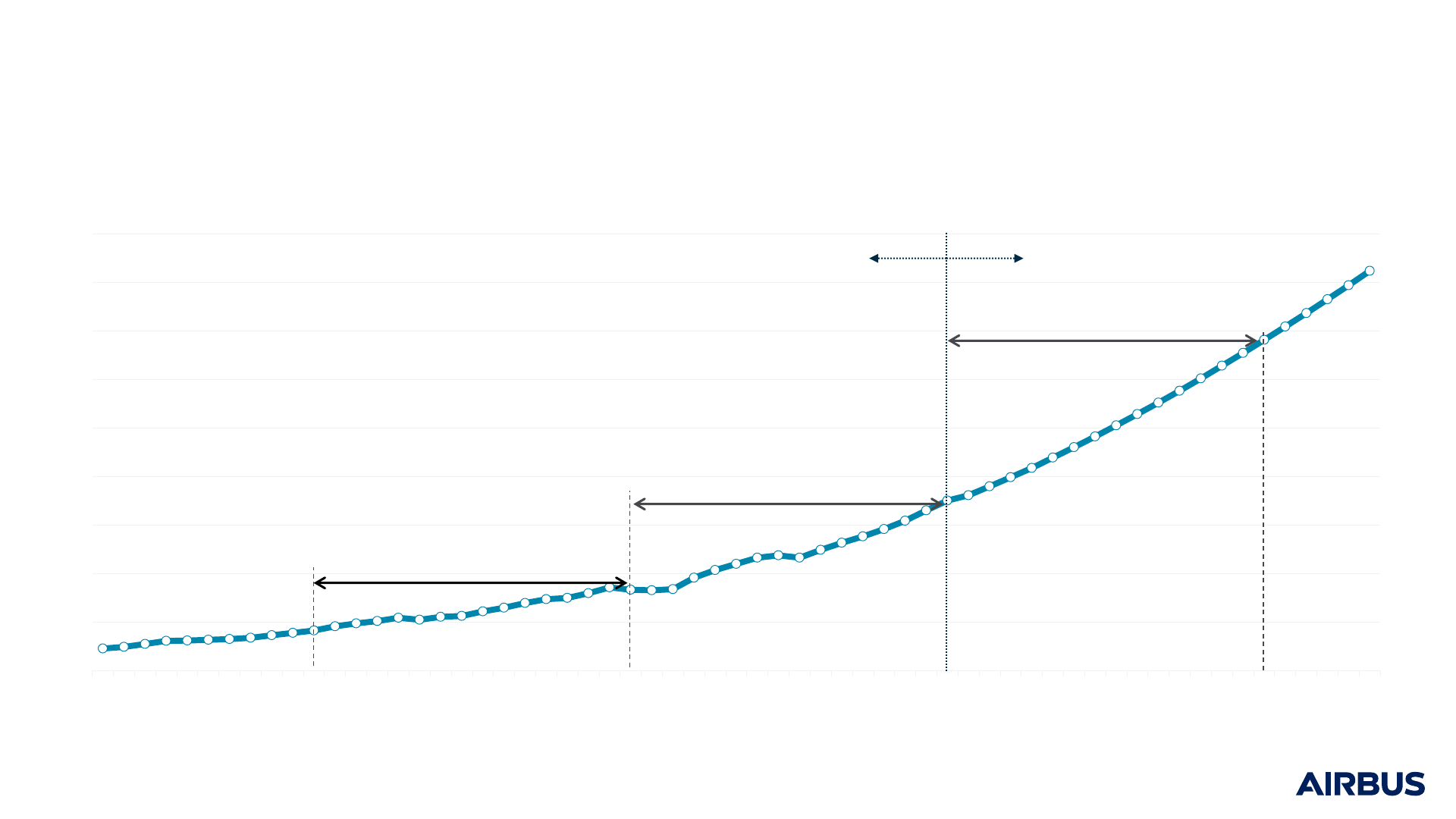
Traffic doubles every 15 years
RPK = Revenue Passenger Kilometre
Source: ICAO, Airbus GMF 2017
16
World annual traffic (trillion RPKs)
0
2
4
6
8
10
12
14
16
18
1976 1981 1986 1991 1996 2001 2006 2011 2016 2021 2026 2031 2036
x2
x2
x2
Airbus GMF 2017: 4.4% growth p.a.
ICAO total traffic
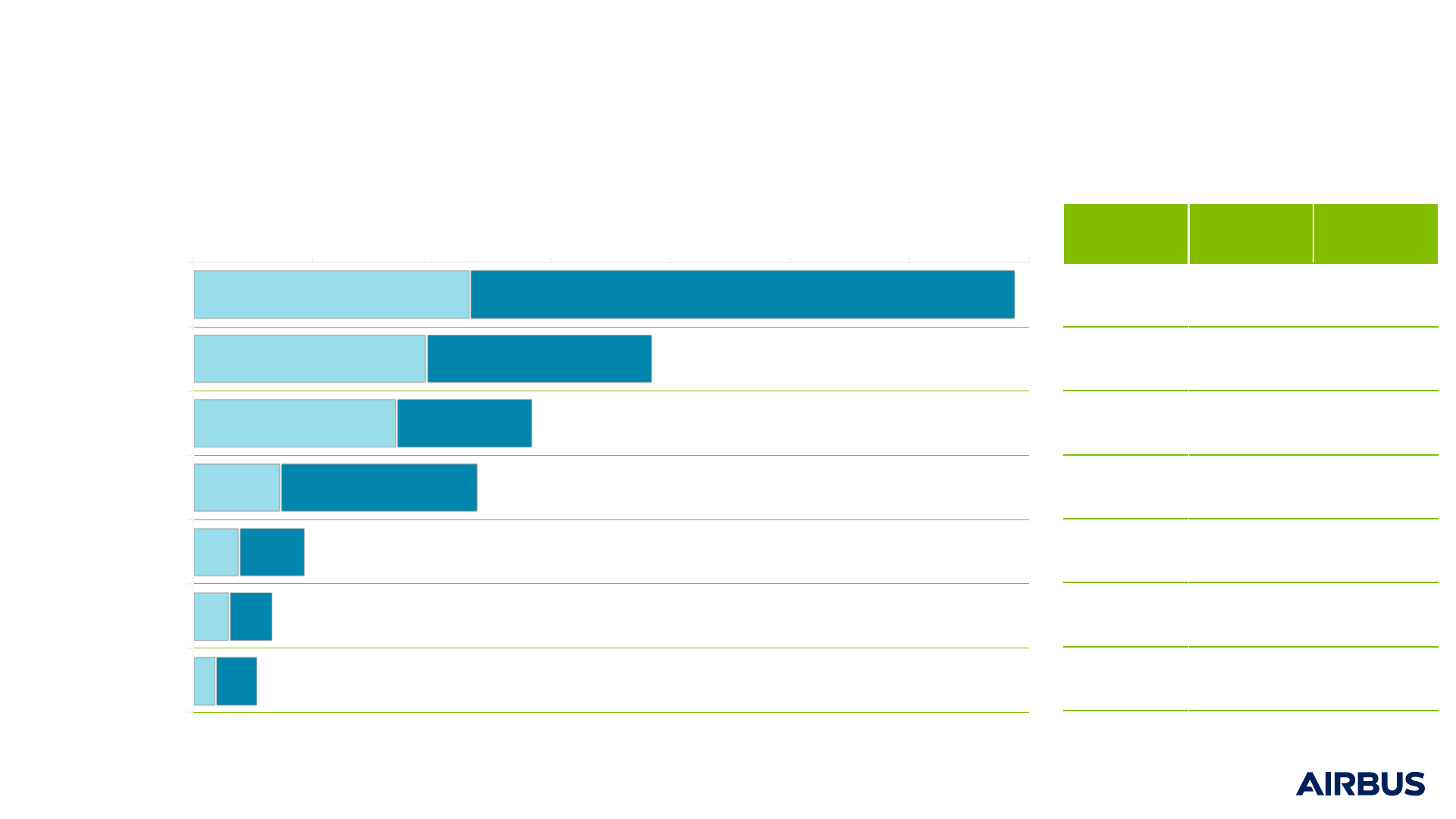
Asia-Pacific continues to grow in importance
Source: Airbus GMF 2017
17
Traffic by airline domicile (trillion RPKs)
0 1 2 3 4 5 6 7
Asia-Pacific
Europe
North America
Middle East
Latin America
CIS
Africa
20-year
CAGR
Share of
2036 RPKs
5.6% 38%
3.4% 21%
2.6% 16%
6.1% 13%
4.5% 5%
4.0% 4%
5.3% 3%
2016 traffic 2017-2036 traffic
Share of
2016 RPKs
30%
26%
22%
10%
5%
4%
3%
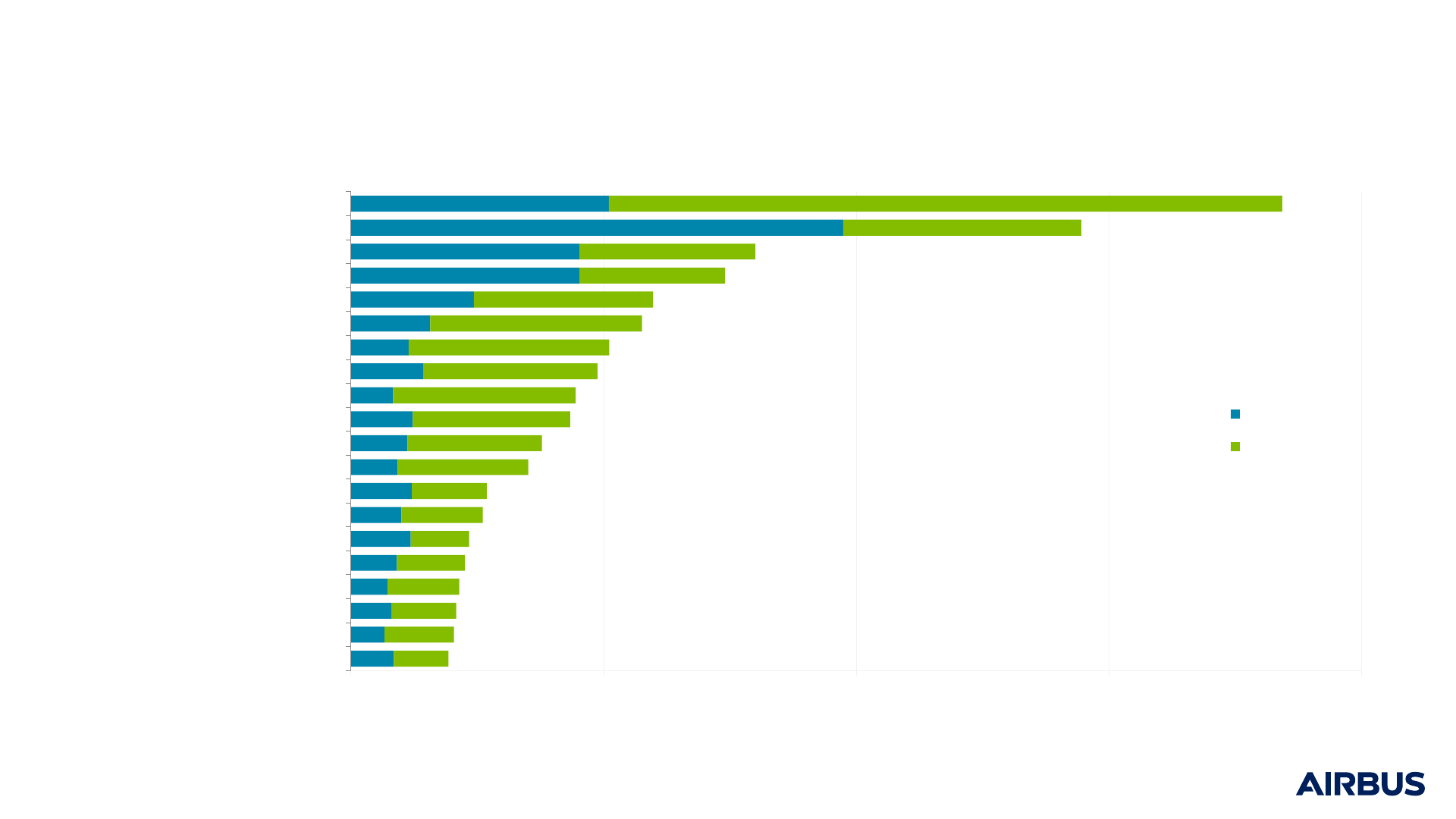
Domestic Chinese traffic to become number one
RPK = Revenue Passenger Kilometre
Source: ICAO, Airbus GMF 2017
18
Annual traffic per leg flow
0.0 0.5 1.0 1.5 2.0
South America - USA
Intra-Middle East
Domestic Brazil
Asia Developped - PRC
Asia Developped - Asia Emerging
Western Europe - South America
Central Europe - Western Europe
Western Europe - PRC
Asia Emerging - PRC
Asia Emerging - Middle East
PRC - USA
Domestic India
Indian Subcontinent - Middle East
Middle East - USA
Domestic Asia Emerging
Western Europe - Middle East
Intra-Western Europe
Western Europe - USA
Domestic USA
Domestic PRC
Trillions RPKs
2016
2036
x3.6
x1.5
x1.8
x1.6
x2.5
x3.7
x4.5
x3.4
x5.4
x3.6
x3.4
x3.8
x2.2
x2.6
x2.0
x2.5
x3.0
x2.6
x3.1
x2.3
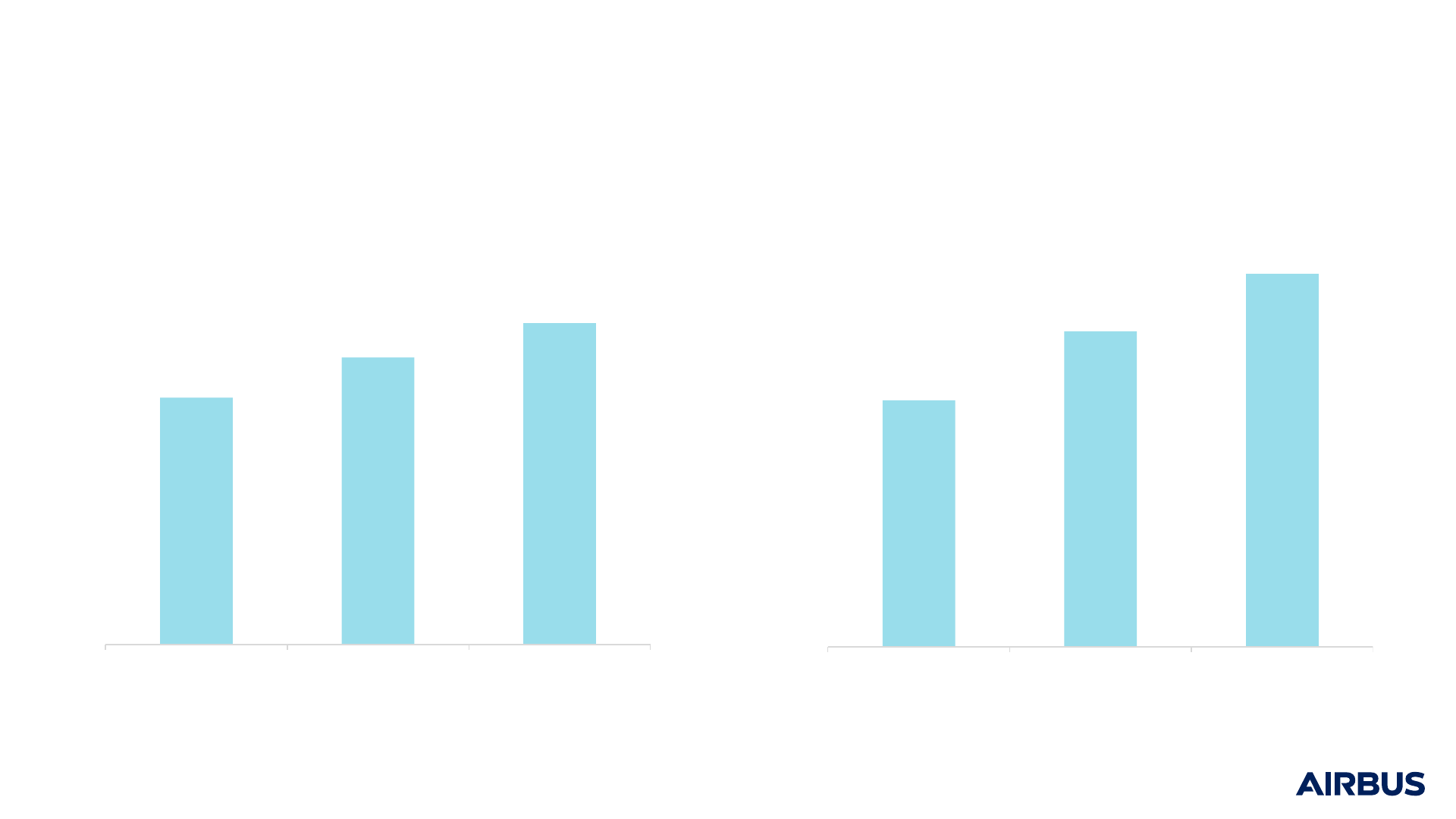
Trend towards densification, especially for Low Cost Carriers
143
150
156
100
110
120
130
140
150
160
170
2006 2011 2016
Note: Aircraft capacity above 100 seats and below 210 seats
Source: OAG – September of each year, Airbus GMF
19
All Airlines average single-aisle aircraft capacity per flight
LCCs average single-aisle aircraft capacity per flight
143
155
165
100
110
120
130
140
150
160
170
2006 2011 2016
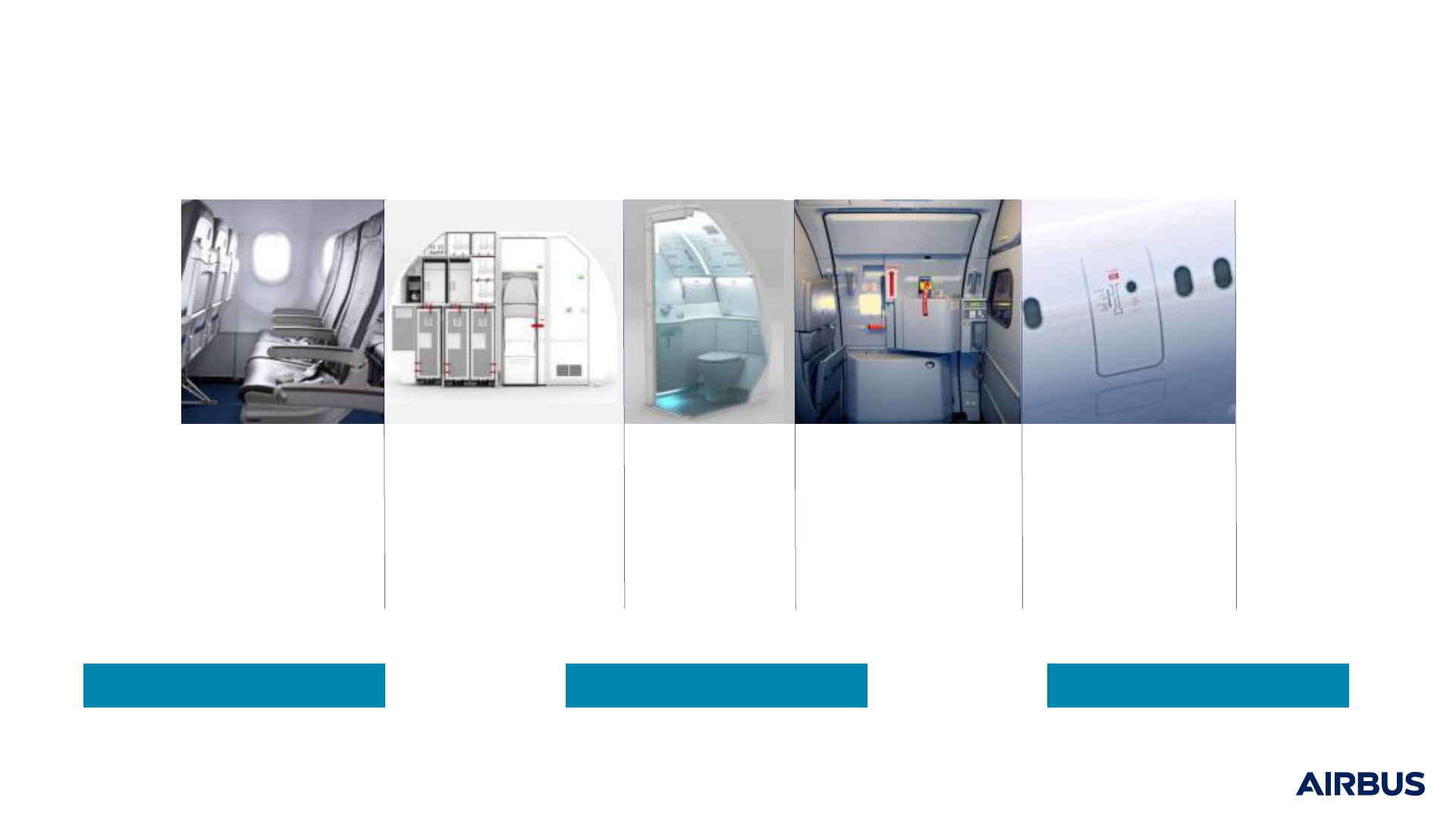
A320 Family cabin enablers can raise A320 Family seat counts by up to 10%
20
Slim-line
seats
Space-Flex
New rear galley
configuration
Smart-Lav
New lavatory
design
New doors rating
Increased exit limit
Airbus
Cabin-Flex
A321neo new door
configuration
A319 156 160 seats A320 180 189 seats A321 220 240 seats
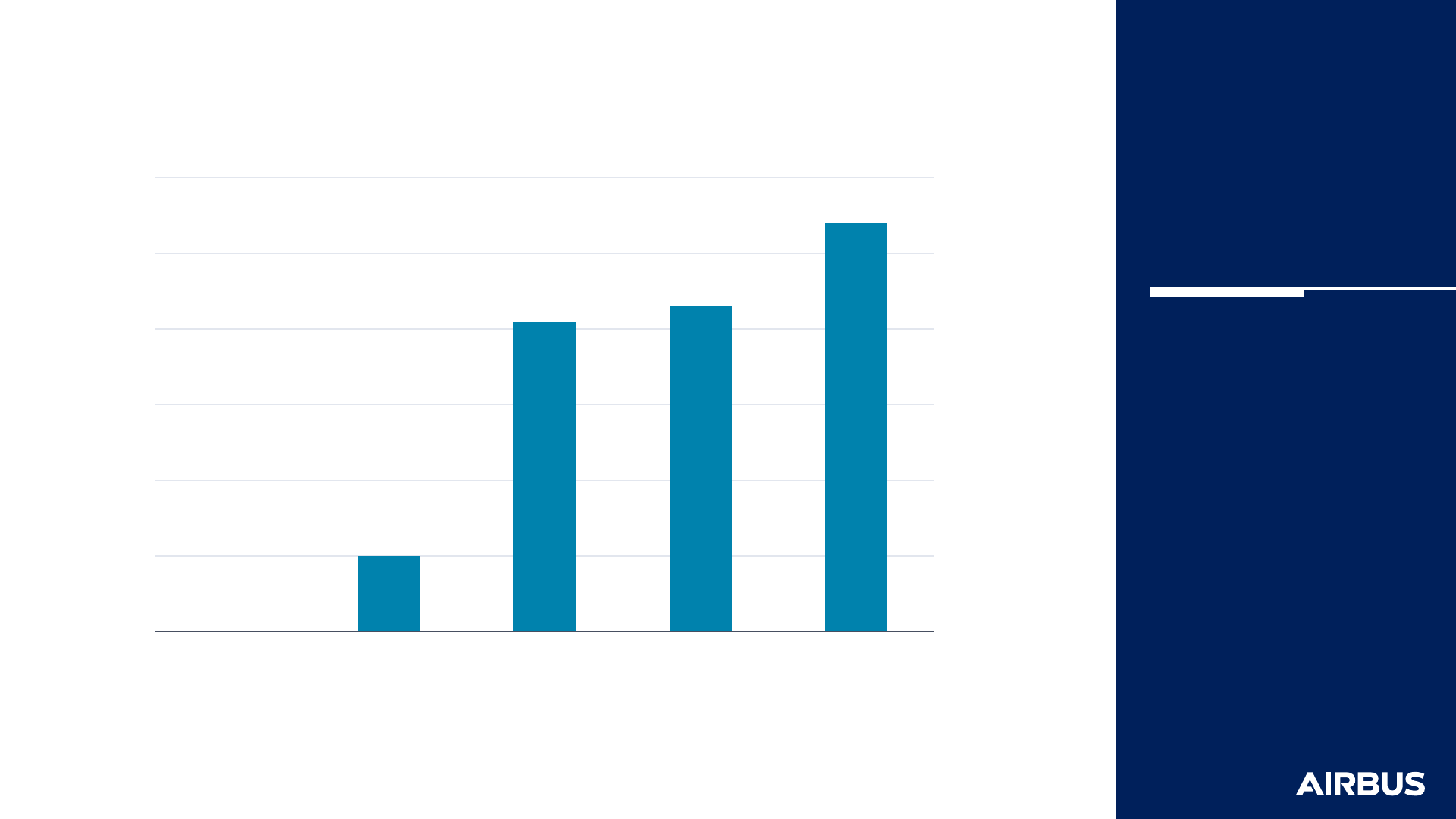
21
Airlines are
choosing cabin
enablers to
increase seat
count beyond 180
seats
Source: Airbus
Densification
trend
A320 deliveries above 180 seats (% total deliveries)
0%
10%
20%
30%
40%
50%
60%
2014 2015 2016 2017 2018
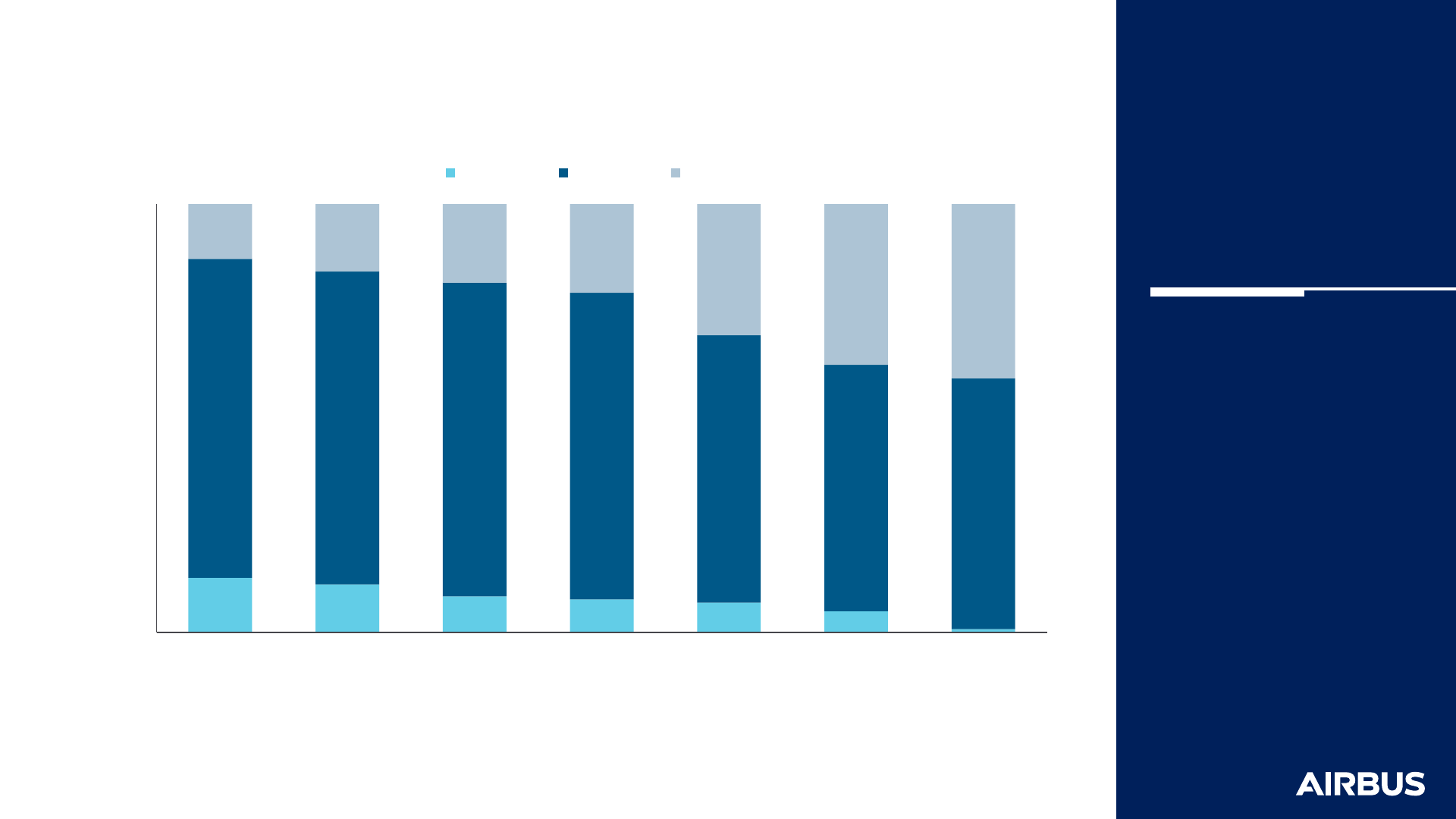
13%
11%
8%
8%
7%
5%
1%
74%
73%
73%
71%
62%
57%
59%
13%
16%
18%
21%
31%
37%
41%
0%
20%
40%
60%
80%
100%
2010 2011 2012 2013 2014 2015 2016
A319 A320 A321
22
The single-aisle
market continues
to move towards
higher capacity
aircraft
Upsizing
A320 Family deliveries
Source: Airbus, End December
2016, includes NEO
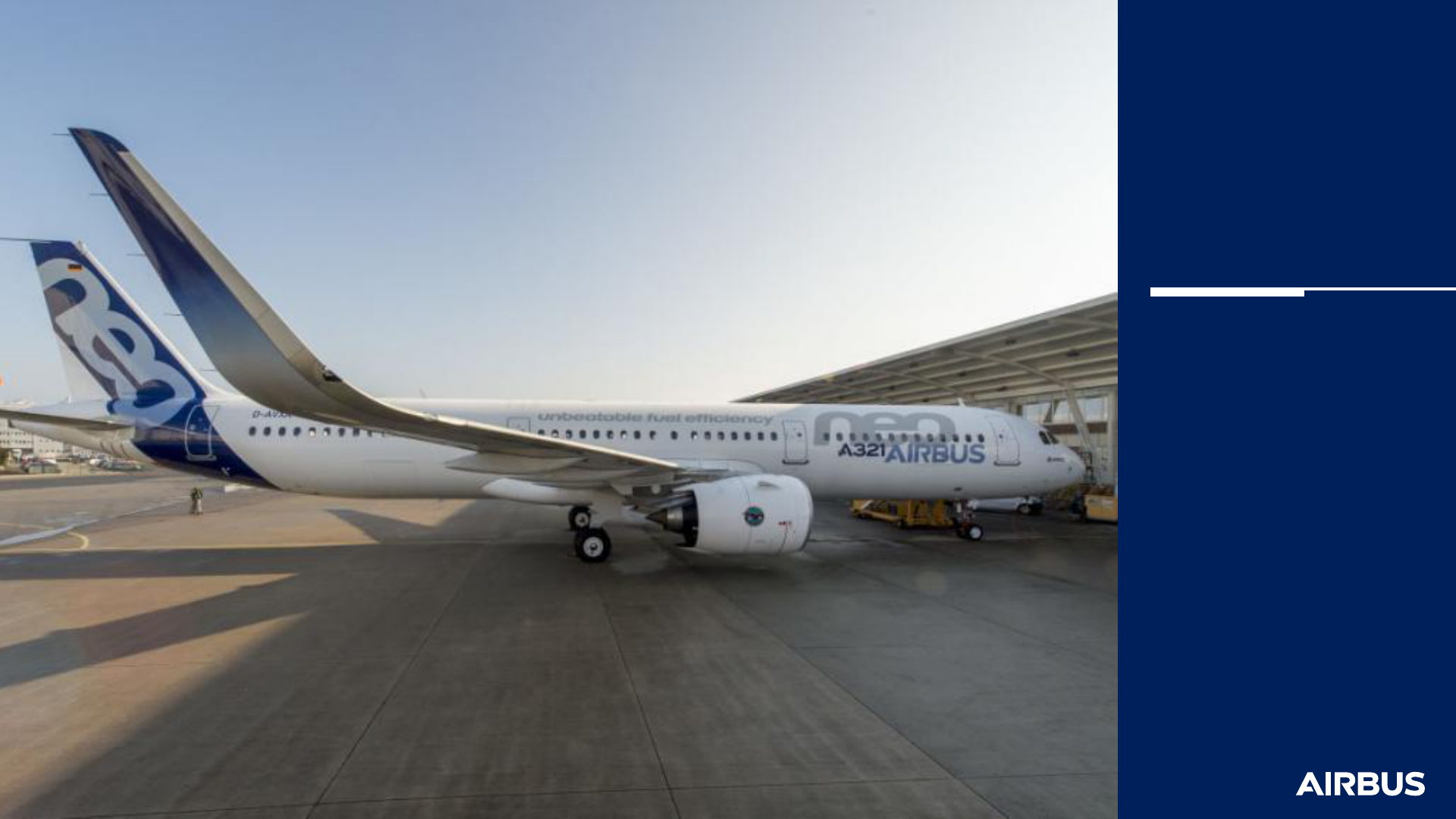
23
65% of net orders
41% of deliveries
of Airbus single
aisles in 2016 were
A321s
A321 –
growing in
popularity
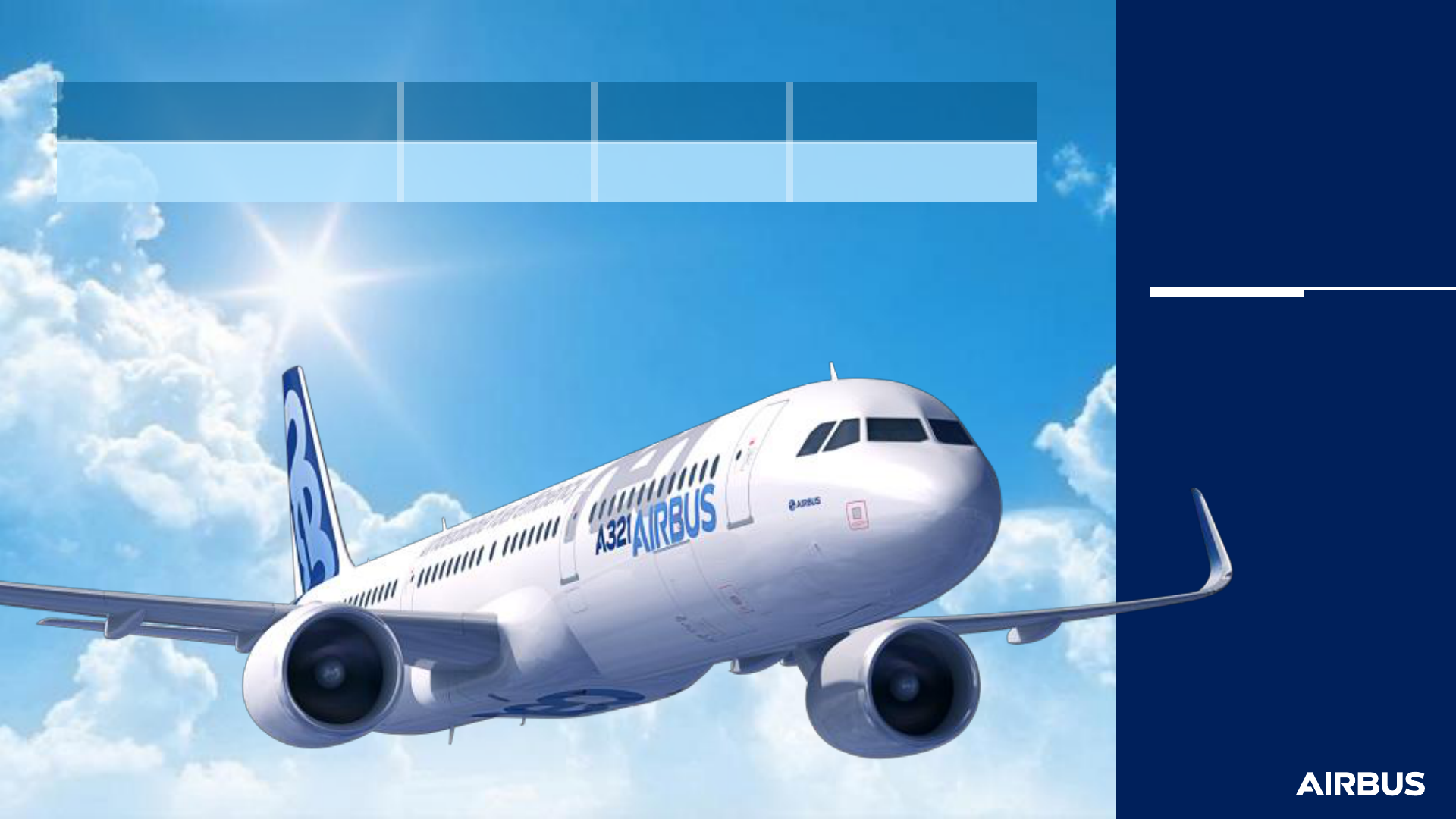
24
Up to 240 seats &
4,000nm range
with unbeatable
fuel efficiency
A321neo
Capacity Range Fuel per seat
A321neo vs. 737 MAX
10
+10 seats +1,000nm 10% lower
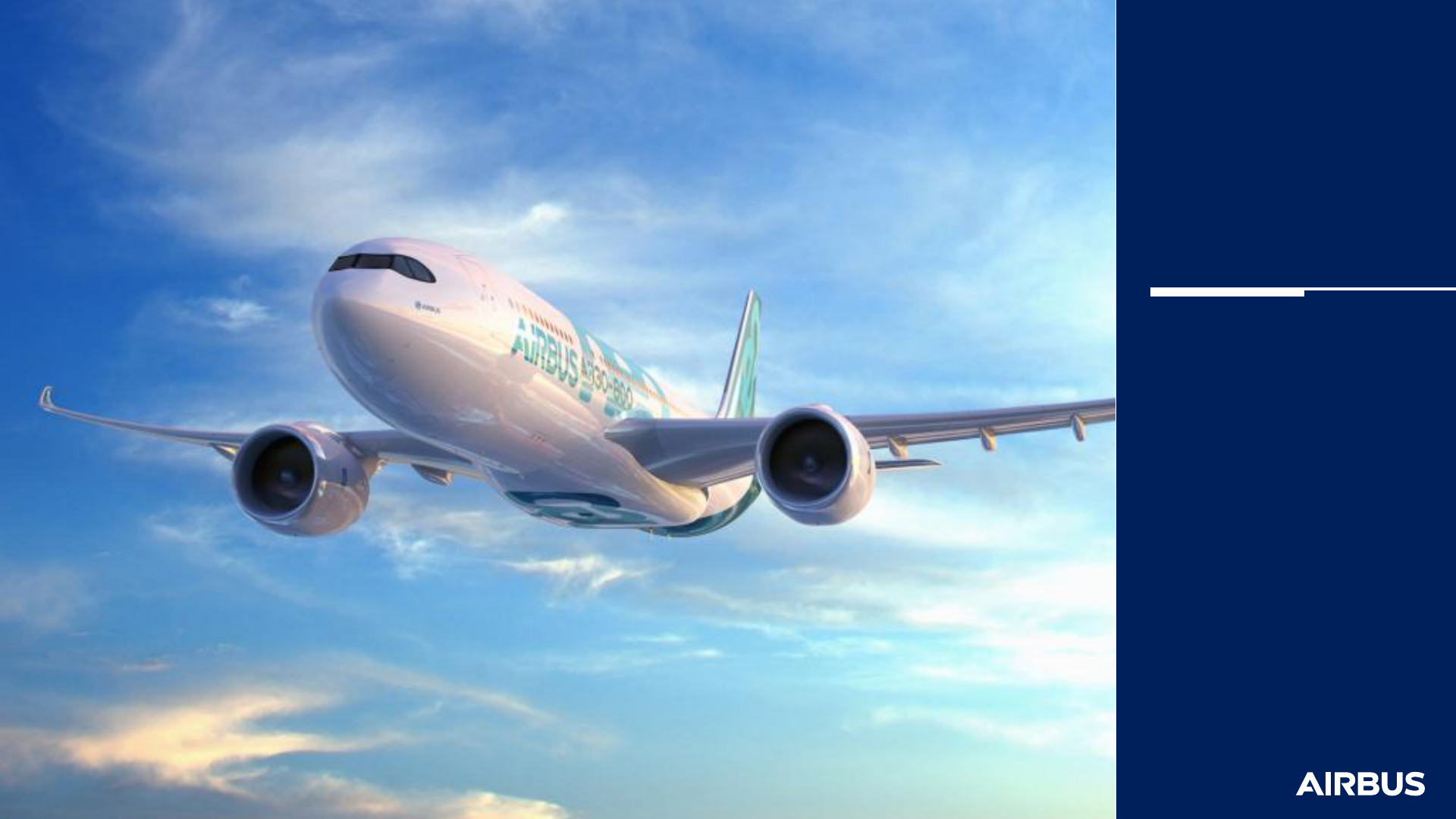
25
… beats the 787
on comfort, fuel
and economics
at $20m to $25m
lower capital cost
A330neo
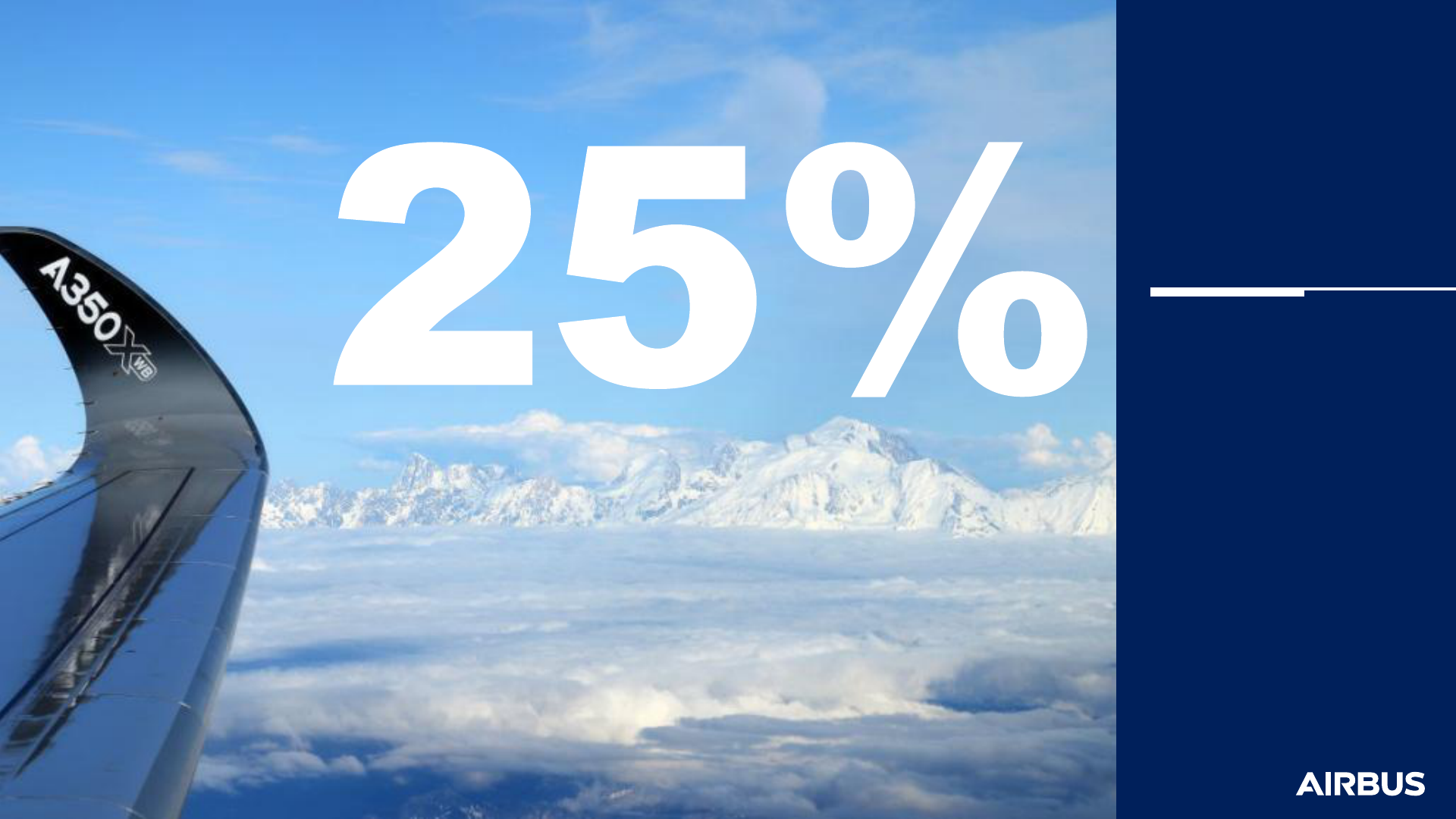
26
25% lower
• operating cost
• fuel burn
• CO
2
emissions
Compared to previous generation
A350 XWB
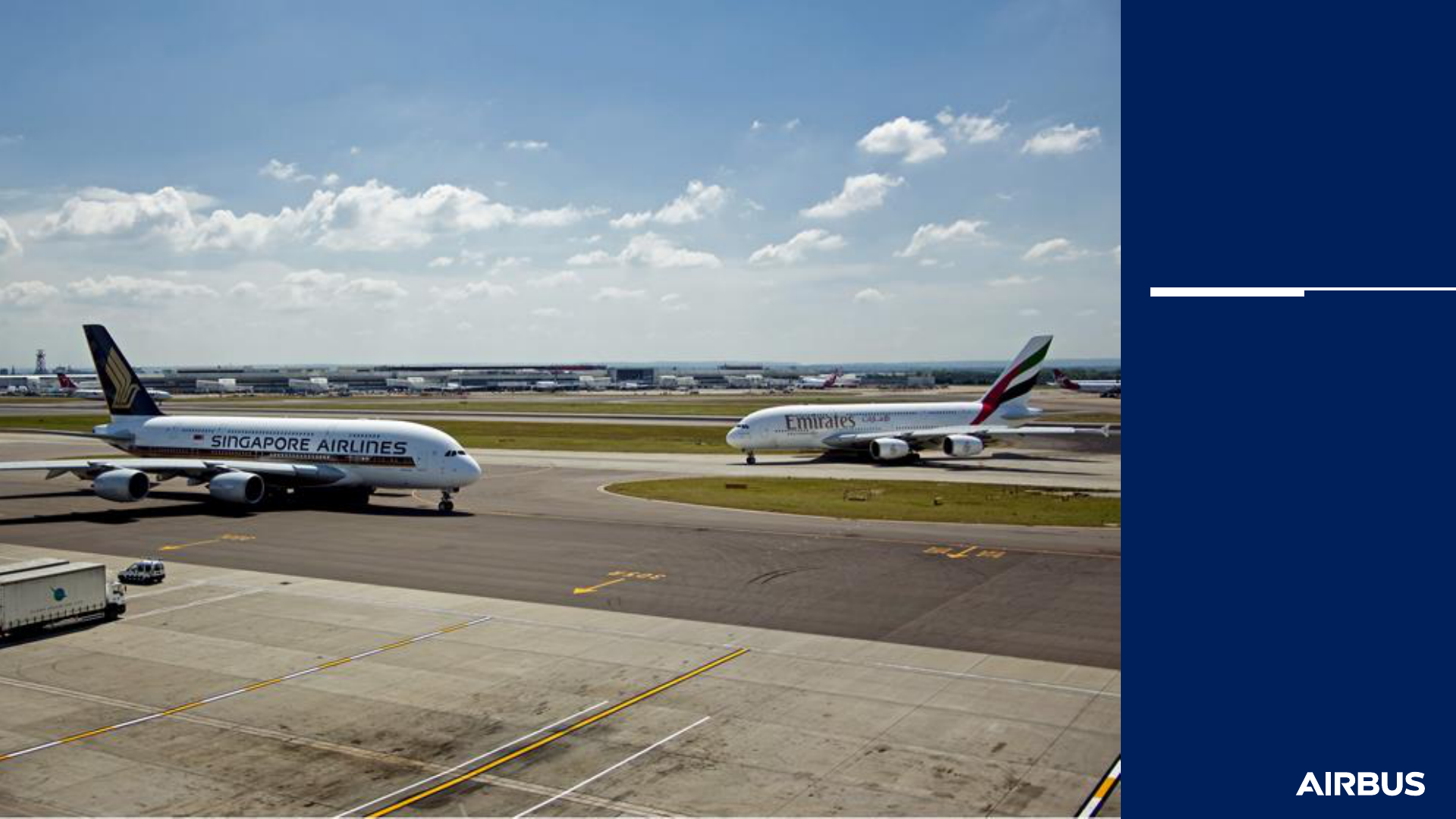
27
In 2016, 10% of all
passengers at
London Heathrow
travelled on 54 daily
A380 flights*
* Inbound and outbound
10% of all
Heathrow
passengers

28
Over 80 additional
seats with same
comfort level
as current
deliveries
* Project development study
A380
new
revenue
enablers
New rear stair
Premium Economy Class at 9-abreast
New forward stair*
Combined crew rest compartment
Economy class at 11-abreast
Upper deck sidewall stowage removal
Upper deck door 3 deactivation*
14 seats
8 seats
6 seats
20 seats
23 seats
3 seats
11 seats
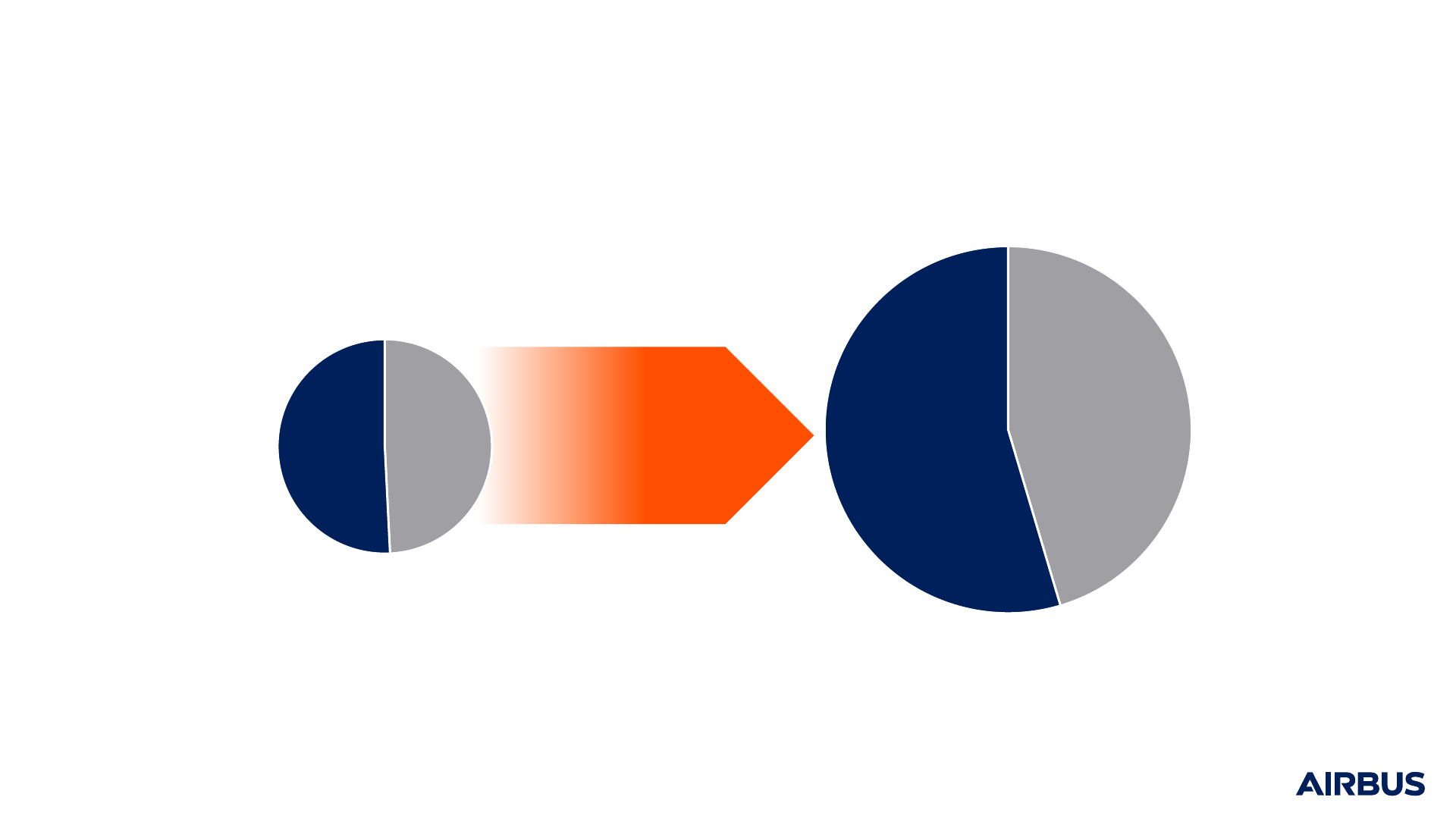
X 2.5
Backlog development 2007 - 2016
Industry backlog
12,589 aircraft
Industry backlog
4,988 aircraft
End 2016
2007
Data to end December 2016
Boeing
2,455
49%
Airbus
2,533
51%
Boeing
5,715
45%
Airbus
6,874
55%
X 2.7
X 2.3
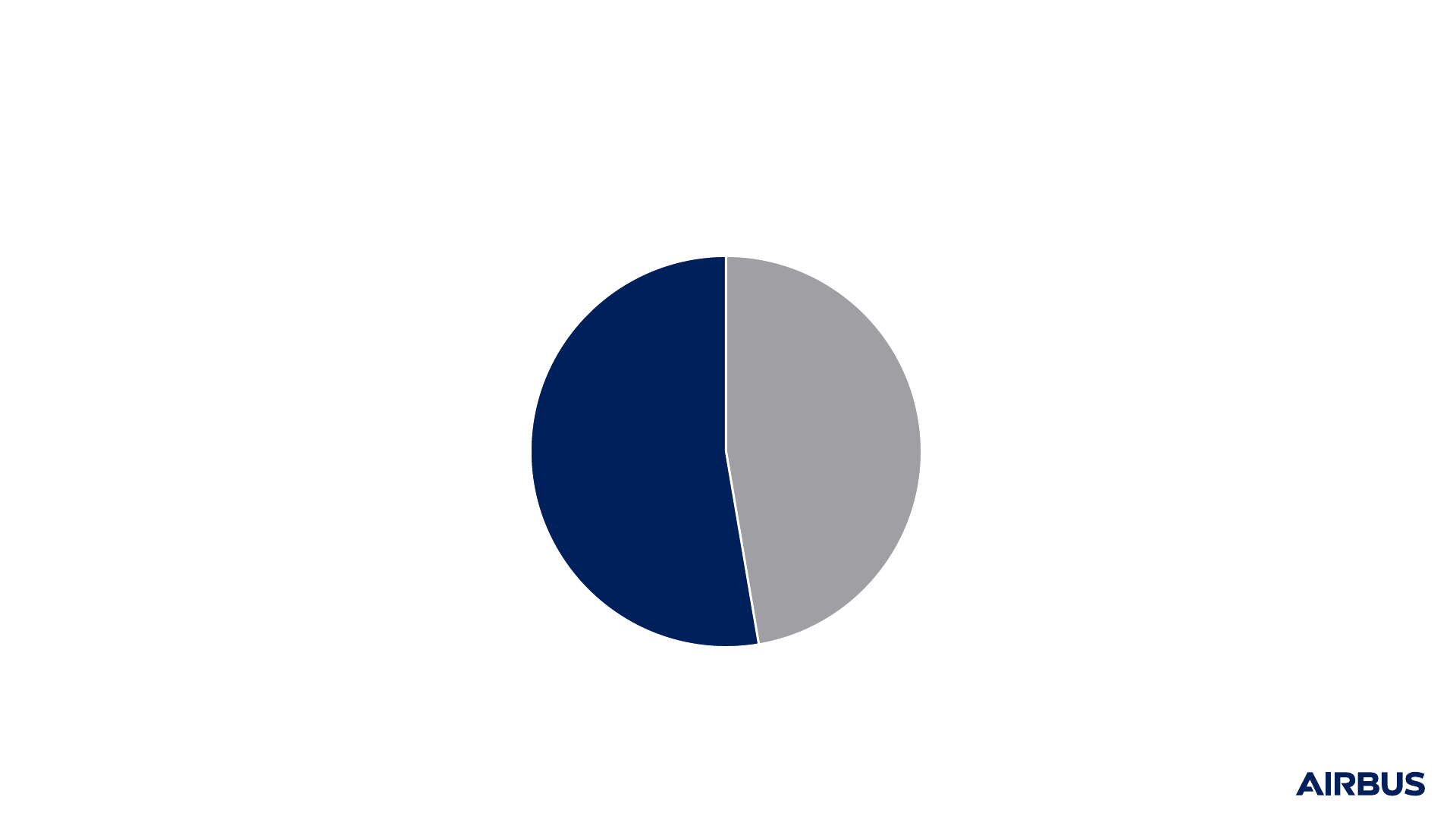
Net market share last 10 years
Boeing
8,978
47%
Airbus
9,995
53%
Data to end December 2016
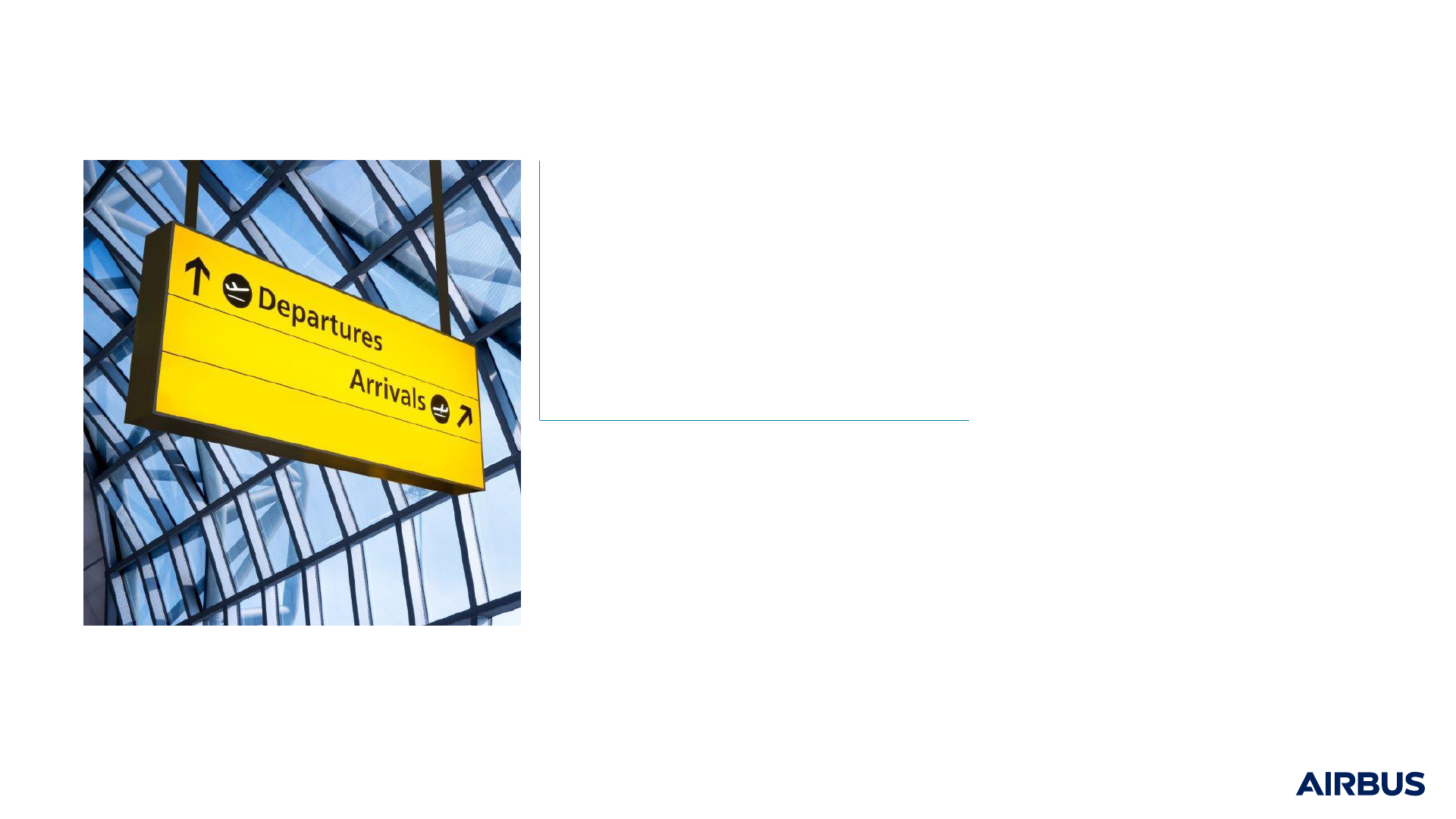
Summary
31
Drivers
Strong & resilient passenger traffic growth
As air transport develops, new drivers become more significant
Middle-class to almost double by 2036
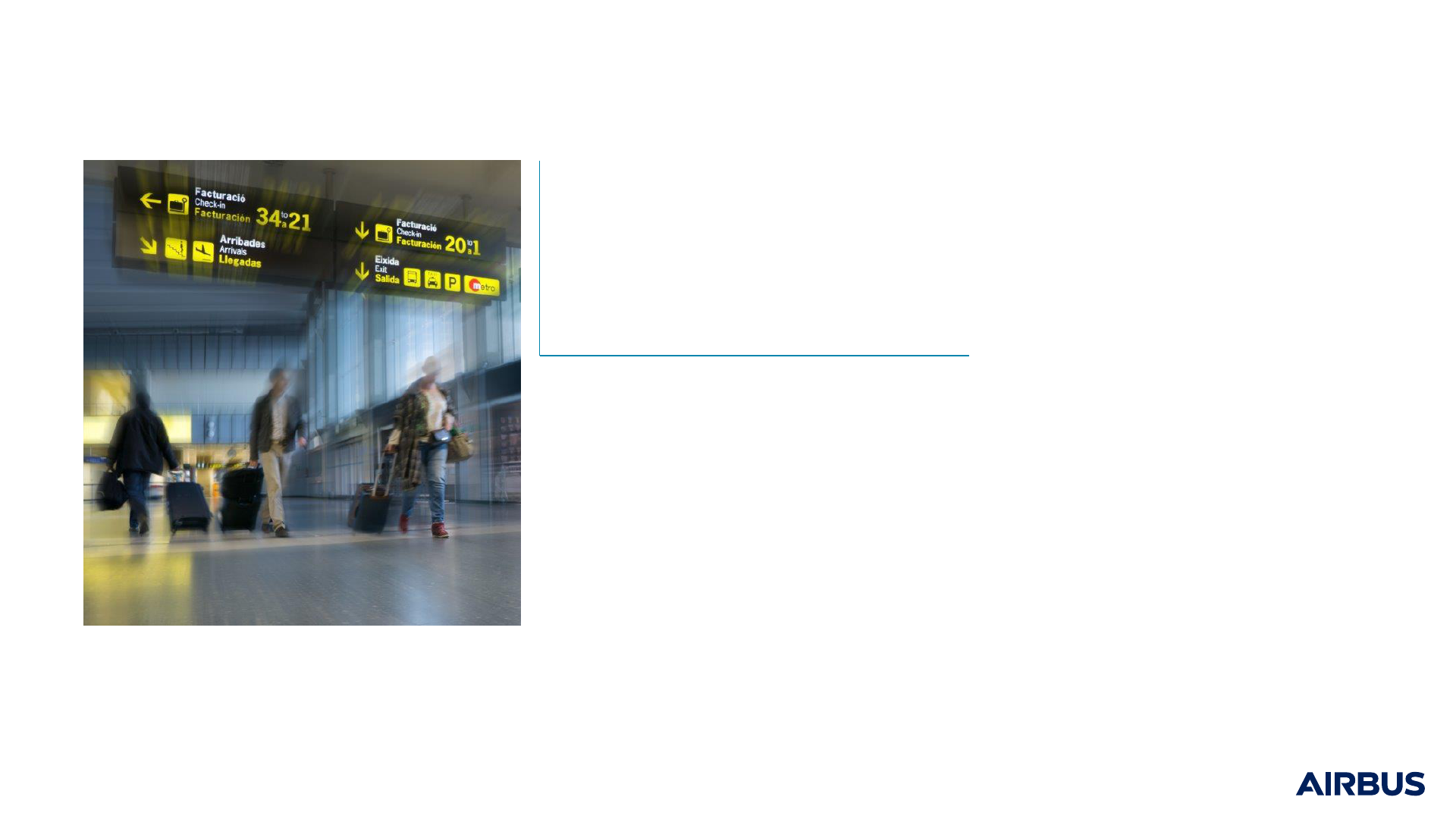
Summary
32
Traffic forecast
Air traffic (RPK) doubles every 15 years
Airbus traffic (RPK) forecast to grow 4.4% p.a.
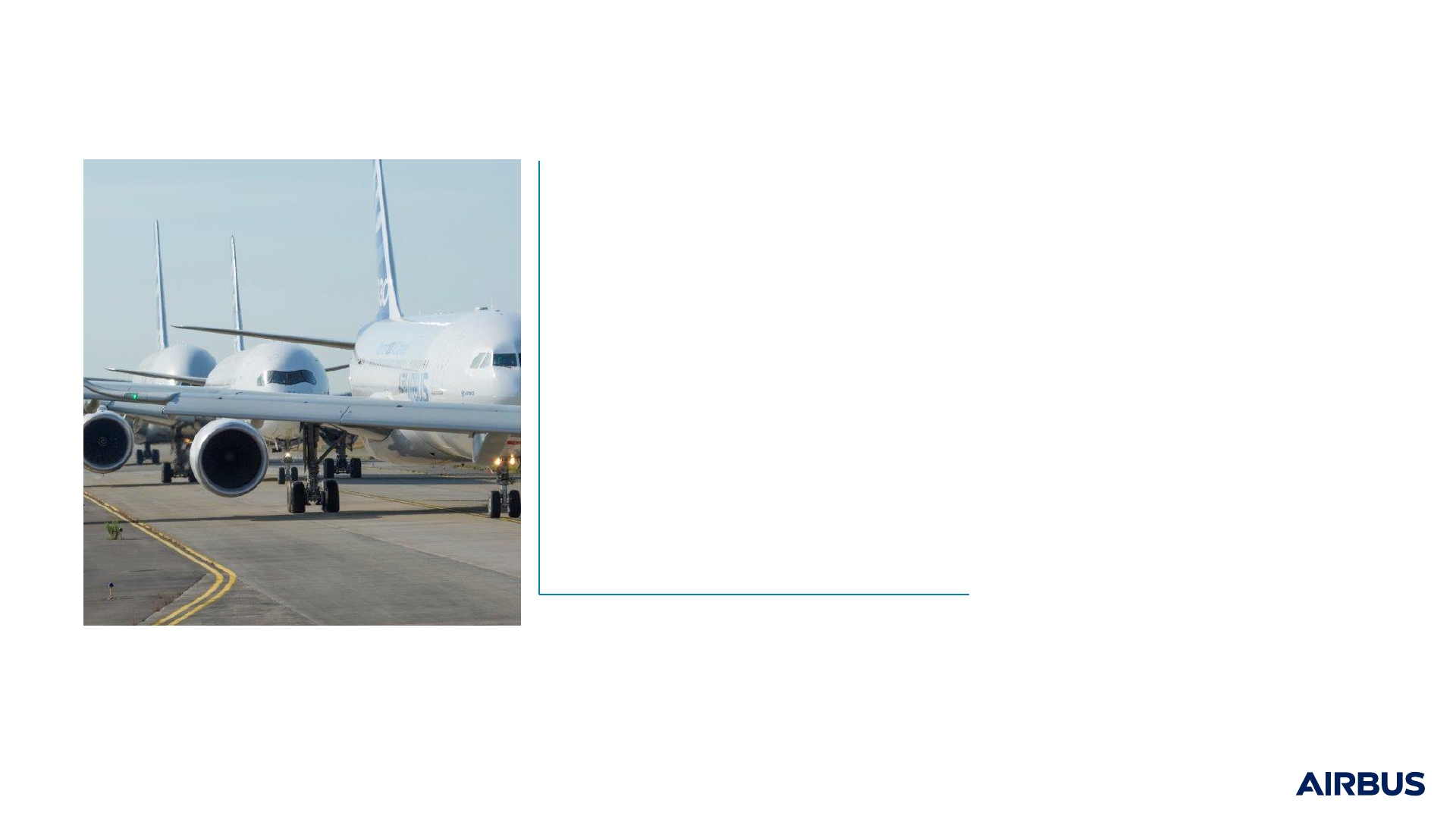
Fleet forecast
34,900 new deliveries by 2036:
~34,170 passenger aircraft
730 freighters
40% of new deliveries for replacement,
60% for growth
Single-aisle: 71% of units
Wide-bodies: 54% of value
Summary
33
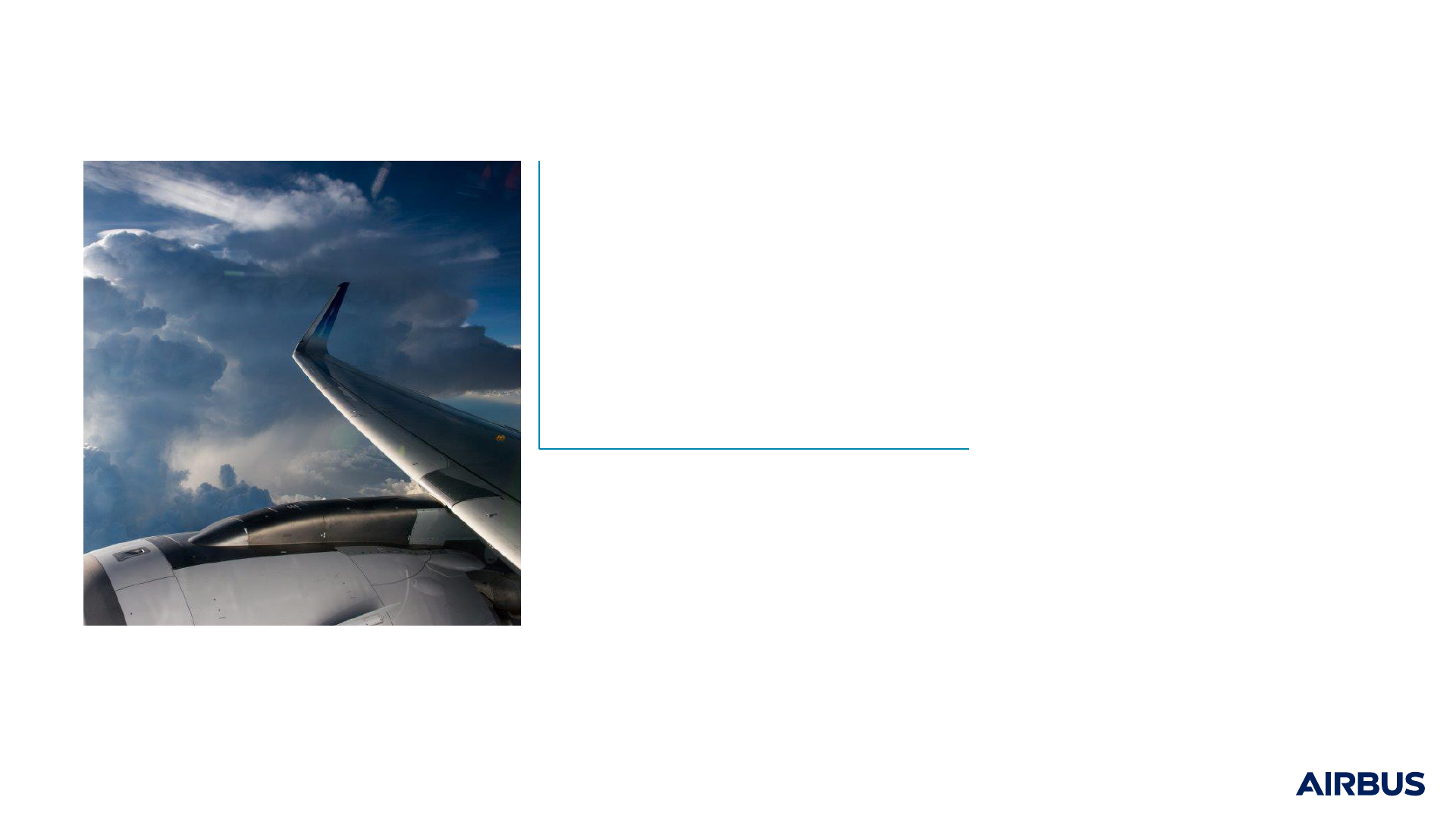
Summary
34
Airbus Family
A321 an ideal entry-point into medium to long-haul markets
A330neo & A350XWB:
the lowest total cost widebody family with superior comfort levels
A380: The solution for future traffic growth
